Well, friends, I’ve been wanting to offer this list for a while, bringing you up to speed with some of the fascinating and often very important books on race and racism that we have for sale here at Hearts & Minds. We have always had a dedicated section about diversity, racial reconciliation, the history of the civil rights movement, and the like. Maybe that is why we got a very scary message under our door from the KKK one fine day decades ago, a threat that I wear as a badge of honor. Not many people bought these sorts of books (except, maybe, evangelicals involved in campus ministry through IVCF or CCO who have been on the cutting edge of speaking about this stuff for years.) But, like a few other categories of books we enjoy showing off, we have them because we should. And we wish they sold better.
Who knew that in the middle of the Coronavirus pandemic and the quarantining two years ago there would be a huge, nation-wide uptick in interest in books by and about black culture, about white privilege, social justice, racial equity, cultural diversity? For a while we could hardly keep some key titles in stock. In 2020 we sold lots of Reading While Black, Be the Bridge, I’m Still Here, My Grandmother’s Hands, Stamped from the Beginning, White Fragility, How to Be an Anti-Racist, The Color of Compromise, Healing Racial Trauma, The Warmth of Other Suns, Bonhoeffer’s Black Jesus, Just Mercy, Me and White Supremacy, Anxious to Talk About It, The Cross and the Lynching Tree, and older classics, from authors like John Perkins and Brenda Salter McNeil to Martin Luther King, Jr., Howard Thurman and John Lewis to Oscar Romero and James Cone. I could name more. It was an exciting time for booksellers almost everywhere, at least those who cared about these things.
We sold books on the immigrant experience, too — again, we had a section on immigration and refugees since our store opened but interest from publishers and the book buying public and some churches grew noticeably. Within a year or so all sorts of newer authors invited white Americans (including white Christians of all sorts) into their world to read about First Nations/indigenous, Latino, Asian American experience, spirituality, and theology. Non-controversial books like Living In Color: Embracing God’s Passion for Ethnic Diversity or Learning from the Stranger: Christian Faith and Cultural Diversity by David Smith or Gracism:The Art of Inclusion by David Anderson were eagerly studied by church groups who had not previously taken up issues of social ethics or public justice. Those that could, dug a little deeper; some were intentional about framing the conversation by the light of Biblical doctrine while others just wanted to read, listen and learn from others, graciously. We sold memoirs and novels and poetry by people of color. New authors captured our attention — within the religious publishing world, at least; authors like Lisa Sharon Harper, Karen Gonzalez and Chanequa Walker-Barnes and Kaitlin Curtice and Kat Armas and Hak Joon Lee were in demand, and we were grateful.
Those wanting to go deeper worked through Matthew Kaemingk’s Christian Hospitality and Muslim Immigration in an Age of Fear or even Willie James Jennings Yale University Press title, The Christian Imagination: Theology and the Origins of Race.
We, here, have much to learn, but we felt like we were somewhat well-positioned to serve a growing interest among our customers. It was a season we will never forget and for which we are grateful.
And, then, the push back began. A few fair concerns and a lot of truly awful nonsense was spread alongside the disinformation about vaccines and the so-called “stolen” election about something called critical race theory. Authors and publishers who should have known better blasted away, often on Fox News or on loud, right-wing websites (although also from more respected sources which did breathy and illogical hit pieces.) These alarmist tirades often came with meager insight and seemingly not much compassion, and the books sold, I’m told, by the tens of thousands.
We’ve been trying to help customers get books they need (and we’ve earnestly tried to serve those on various sides of the culture wars) and we always remind readers to “think Christianly” and to exercise discernment. People of faith should agree in our mutual efforts to be wise and good. We are free, the Bible says, so we can read what we want, but our freedoms should be used for the building up of the community. We should be critical thinkers in generous ways so we can promote the gospel’s healing and hope. As Englewood Book Review founder Chris Smith put it in the title of one of my favorite books, we should be Reading for the Common Good.
Which brings me back to this new list. We’ve just been too stressed and busy and constrained by the pandemic protocols, and attracted to so many books on so many topics, to get everything done we’ve wanted to. This list is long, but I skipped a lot, knowing I can’t describe all that we have. Here we will share with you a bit about some of the most interesting books in this field to appear in the last year or so. A few are very new.
Forgive me if this seems blunt, but if you, like me, have been properly busy reading widely, and you’ve perhaps fallen away from reading more intentionally into this topic, I invite you to follow through with the stuff you learned two years ago and the commitments you may have made then. Perhaps you feel like you’ve read enough on race and diversity, or maybe you can’t bear any more. I get it. But here ya go, anyway. I invite you to pray and seek God’s face and listen to the Spirit, which may be beckoning you further in. If so, here are some recent titles that might be worth reading and talking about with others who may want to refresh their commitments to learning more about racial justice. As always, thanks for caring.
ALL BOOKS CAN BE ORDERED AT HEARTS & MINDS BY USING THE ORDER LINK AT THE BOTTOM OF THIS COLUMN.
ALL BOOKS ARE 20% OFF.
SERIOUS BOOKS THAT STUDY THE HISTORY OF THE PROBLEM
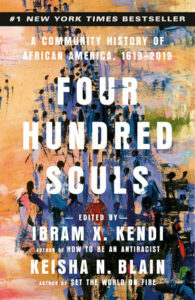 Four Hundred Souls: A Community History of African America, 1619 – 2019 edited by Ibram X. Kendi and Keisha N. Blain (One World) $32.00 hardback // $20.00 paperback OUR SALE PRICES = $25.60 (hardback) // $16.00 (paperback)
Four Hundred Souls: A Community History of African America, 1619 – 2019 edited by Ibram X. Kendi and Keisha N. Blain (One World) $32.00 hardback // $20.00 paperback OUR SALE PRICES = $25.60 (hardback) // $16.00 (paperback)
Ibram X. Kendi wrote two of the biggest selling books in the recent renaissance of contemporary work in this field, the 2016 classic, Stamped from the Beginning and the 2019 polemic, How to Be an Anti-Racist. His co-author here, Keisha Blain, has written a number of scholarly books, including Set the World on Fire on the black intellectual tradition and a great book on Fannie Lou Hamer, Until I Am Free.) Here they have compiled “a chorus of extraordinary voices” — 90 passionate and often brilliant writers and thinkers, offering historical vignettes, vivid analysis, personal stories, fiction, and more. It has a startling array of different perspectives offering a “communal history” on 400 years worth of topics. Some of what they episodes and stories and concerns they write about you will have heard about, some maybe not. There is so much to learn. Some of these authors are famous, some are not. This is an amazing resource; I don’t say this often but we recommend the thick hardback, but we are glad for the less costly paperback.
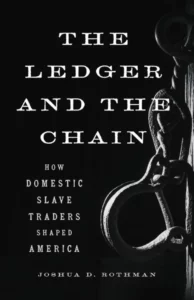 The Ledger and the Chain: How Domestic Slave Traders Shaped America Joshua D. Rothman (Basic Books) $35.00 OUR SALE PRICE = $28.00
The Ledger and the Chain: How Domestic Slave Traders Shaped America Joshua D. Rothman (Basic Books) $35.00 OUR SALE PRICE = $28.00
Much has been written about the international slave trade but less about the uniquely American story told here, about three respected businessmen capturing people from the Upper South and sending them to the cotton and sugar fields of the Deep South. This study of the under-examined US slave trade shows how it was integral to the rise of interstate commerce, the flow of credit, and the establishment of new transportation routes. It is a stunning, devastating, history, essential for anyone wanting to understand the development of American business, capitalism, or who is speaking about faith in the marketplace. As one reviewer (in Rekon) put it:
In popular culture, we’ve cast slave traders at social pariahs but Joshua Rothman’s book refutes that whitewashed narrative. In many ways, slave traders were celebrated businessmen and he traces the stories of three of the biggest slave traders to show how much the economies of the South and the North relied on America’s original sin.
As Drew Faust of Harvard puts it, The Ledger and the Chain is,
A tour de force of deep research and vivid detail that illuminates big and critical issues. Beautifully written too. Moving, horrifying, unforgettable.
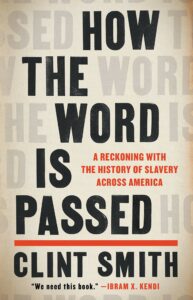 How the Word is Passed: A Reckoning with the History of Slavery Across America Clint Smith (Little Brown) $29.00 OUR SALE PRICE = $23.20
How the Word is Passed: A Reckoning with the History of Slavery Across America Clint Smith (Little Brown) $29.00 OUR SALE PRICE = $23.20
This has been a significant New York Times best-seller and is being used in book clubs and classes — that a study of how slavery is acknowledged and commemorated has been so widely read is itself fascinating. This new lens for seeing is notable and it is important. Helpfully and gladly, Clint Smith (a staff writer for The Atlantic) is an amazing wordsmith who crafts very moving prose. Matthew Desmond, author of the powerful Evicted, calls it “a work of moral force and humility,” and Annette Gordon-Reed, the Pulitzer-Prize winning author The Heningses of Monticello says it is “beautifully written, evocative and timely.”
It is a vital history, and it once again explores the matter of slavery (and how it is remembered.) But the deep lesson is vital even beyond that. I like these words about it:
How the Word is Passed sheds light on the contested narratives beneath the surface of our collective national identity, inviting us to dig a little deeper, reminding us never to take received histories for granted.
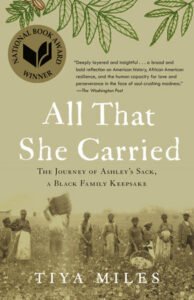 All That She Carried: The Journey of Ashley’s Sack, A Black Family Keepsake Tina Miles (Random House) $18.99 OUR SALE PRICE = $15.19
All That She Carried: The Journey of Ashley’s Sack, A Black Family Keepsake Tina Miles (Random House) $18.99 OUR SALE PRICE = $15.19
This unforgettable book earned the coveted National Book Award for nonfiction and was a finalist for a number of prestigious awards, from the Kirkus Prize to one of Publisher Weekly’s Top Ten Books of 2021. The hardback was handsome but the paperback, now out, is very nice.
I needn’t say much, but folks who have read this study of the humble items in this sack and how it was passed down have just loved it. The bag came from an enslaved woman named Rose who in 1850s South Caroline gave her nine-year old daughter Ashley a cotton bag with a few items as she was being sold away. Decades later, Ashley’s granddaughter Ruth embroidered the family history on the sack “in spare, haunting language.” It is a poignant story of resilience and, as one reviewer put it, “a testament to the power of story, witness, and unyielding love.”
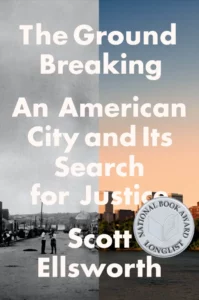 The Ground Breaking: An American City and Its Search for Justice Scott Ellsworth (Dutton) $28.00 OUR SALE PRICE = $22.40
The Ground Breaking: An American City and Its Search for Justice Scott Ellsworth (Dutton) $28.00 OUR SALE PRICE = $22.40
I do not know if many Americans, at least most white Americans who were not from Oklahoma, knew about the horrific, heartbreaking, gripping story of what Rev. Dr. William Barber has called “one of America’s worst racial atrocities.” Searing as it may be, this is an important bit of ground-breaking research, called meticulous and elegant. There have been books on this, some folks know about it, but most of us don’t.
Why did it take the death of so many unarmed black citizens at the hands of heavily armed police in recent years, and a brave football player who took the knee, and the formant of the BLM movement to create a space for this sort of storytelling to get a hearing? For this sort of horror to come to light, now? We are grateful for books like this, for the coverage NPR and other outlets gave it, and how this story is now acknowledged.
The good Reverend Barber continues, noting that Ellsworth “shows us how we can uncover our past and come to grips with our future. His literally groundbreaking research and engaging prose pull us toward the call of justice today.”
America cannot address the crisis in which we find ourselves because we are unwilling to acknowledge the road that brought us here. We are determined to look away… Scott Ellsworth is willing to dig and willing to help us to see who we have been in hopes that we will rise to who we must be. The Tulsa massacre of 1921 is one of the most significant and revealing episodes of American history, and one we must confront in order to find our way. The Ground Breaking will rattle you, and it should. It will move you toward a harder wisdom, and it must. — Tim Tyson, senior research scholar, Center for Documentary Studies at Duke University, author of The Blood of Emmett Till and Blood Done Sign My Name
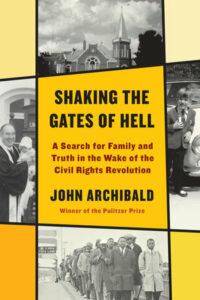 Shaking the Gates of Hell: A Search for Family and Truth in the Wake of the Civil Rights Revolution John Archibald (Knopf) $28.00 OUR SALE PRICE = $22.40
Shaking the Gates of Hell: A Search for Family and Truth in the Wake of the Civil Rights Revolution John Archibald (Knopf) $28.00 OUR SALE PRICE = $22.40
I don’t know if the cover design evokes the early 1960s but this author was born in April 1963 in the white part of Birmingham. As he explains, “I never knew, until much later, that as my mother went into labor, the foot soldiers of revolution gathered across the county line, that at the moment of my birth, Birmingham readied for a battle that was long overdue. The Reverend Dr. Martin Luther King, Jr. had not yet put his Dream to words, but he had come to this town to change the world with another masterpiece.”
John Archibald graduated from the University of Birmingham and won a Pulitzer Prize for reporting in 2018 for reporting. He has a good eye for detail, is an excellent writer, and tells us here about what it was like growing up in the deep south in a long line of Methodist preachers. Can you imagine reading “Letter from a Birmingham Jail”, maybe in college, and realizing it was addressed to, among others, your own father? To come to understand the nature of silence and complicity? It is, as they say, a journey of discovery.
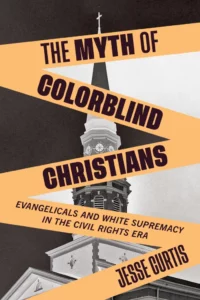 The Myth of Colorblind Christians: Evangelicals and White Supremacy in the Civil Rights Era Jesse Curtis (New York University Press) $32.00 OUR SALE PRICE = $25.60
The Myth of Colorblind Christians: Evangelicals and White Supremacy in the Civil Rights Era Jesse Curtis (New York University Press) $32.00 OUR SALE PRICE = $25.60
Dr. Curtis is a professor of history at Valparaiso and is a significant voice in the conversations about history, memory, and the role of religion in American culture. Blurbs on the back of this powerful volume are from Paul Harvey, Jemar Tisby, and Kristin Kobes Du Muz, all stellar historians and popular writers who have served us well with historical acumen offered for educated and open-minded fellow believers and all citizens wanting to learn about white evangelicalism in these turbulent years, and, especially, what some might call the post-civil rights years — the 70s and 80s. I am very aware of some of the stories he tells, including ‘70s-era conflicts at evangelical colleges, from Calvin College in Grand Rapids to Eastern in Philly; the ministry of leaders I admired such as Bill Pannell and Tom Skinner are described and evangelical church conflicts are explored, even as things like “personal kindness” or a focus on the gospel prevented some evangelicals for adopting a more comprehensive, structural understanding of how institutional racism works. As Du Mez puts it, this is “religious history at its best.” She insists that it is an “immensely clarifying book.”
This book shows how platitudes about equality and not seeing racial differences actually perpetuated the segregated and unequal status quo in many white evangelical churches, colleges, and institutions. It is vital reading for understanding just how salient race remains in some Christian circles. This is the book on the history of white evangelicalism I have been waiting for. —Jemar Tisby, author of The Color of Compromise and How to Fight Racism
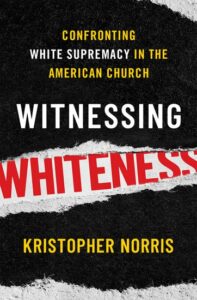 Witnessing Whiteness: Confronting White Supremacy in the American Church Kristopher Norris (Oxford University Press) $28.95 OUR SALE PRICE = $23.16
Witnessing Whiteness: Confronting White Supremacy in the American Church Kristopher Norris (Oxford University Press) $28.95 OUR SALE PRICE = $23.16
This is another exceptionally valuable book that came out this year that explores how America’s white churches tend to (in the words of M. Shawn Copeland, Professor Emerita of Theology at Boston College) “sacralize… socially constructed whiteness.” In other words, Norris calls on us to figure out how we got ourselves into this mess.
In the words of Jennifer McBride (herself a Bonhoeffer scholar, by the way, and author of the excellent The Church for the World: A Theology of Public Witness),
This is a stunning book. In captivating and accessible language, Norris argues that white supremacy is not a force in which white Christians are sometimes complicit but it is an invention of the tradition, defining its theology and practice.
Oh my. Could that be true? David Gushee — who has been immersed in various corners of the evangelical world (from working for Ron Sider to Al Mohler) and within more mainline Protestant and ecumenical circles — says Witnessing Whiteness “is a breakthrough work in the project of diagnosing, understanding, and repenting white supremacism in US Christianity.”
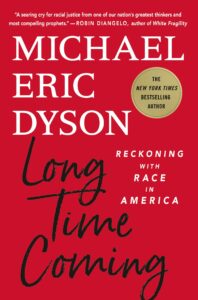 Long Time Coming: Reckoning with Race in America Michael Eric Dyson (St. Martin’s Press) $25.99 OUR SALE PRICE = $20.79
Long Time Coming: Reckoning with Race in America Michael Eric Dyson (St. Martin’s Press) $25.99 OUR SALE PRICE = $20.79
If I can get a few Hearts & Minds customers and BookNotes readers to buy a Dyson book or two, I can rest; he has a huge following but it is my sense that he is not well known and under appreciated within most white Protestant circles. He’s a scholar, a public intellectual, a media star (not long ago I linked to his witty piece about the best music on Colbert when they were pushing his big collection Entertaining Race) and pastor. This hand sized hardback is a good read, arranged as a set of letters reflecting on what exploded the previous year after the murder of George Floyd. It is eloquent and powerful — Robin Diangelo calls it “a searing cry for racial justice from one of our nation’s greater thinkers and most compelling prophets.” Yes, some put him alongside the likes of Cornell West, and that is very high praise indeed. I mentioned it before and thought I should highlight it again, here.
In Long Time Coming Dyson offers a “brilliant and fiercely eloquent work that traces the roots of racism.” Naturally, he has to explore slavery and Jim Crow and recent police brutality and ask tough questions about where we are today as a nation and a people. It is stuff we need to know, content we need to read about, and read about again — at least most white readers need to. Dyson is a good teacher and we should listen to him.
Michael Eric Dyson is one of the nation’s most thoughtful and critical thinkers in social inequality and the demands of justice. Long Time Coming, his latest formidable, compelling book, has much to offer on our nation’s crucial need for racial reckoning and the way forward. — Bryan Stevenson, author of Just Mercy: A Story of Justice and Redemption
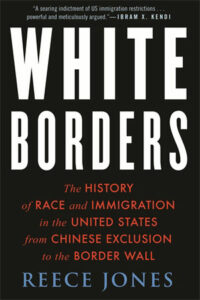 White Borders: The History of Race and Immigration in the United States from Chinese Exclusion to the Border Wall Reece Jones (Beacon Press) $25.95 OUR SALE PRICE = $20.76
White Borders: The History of Race and Immigration in the United States from Chinese Exclusion to the Border Wall Reece Jones (Beacon Press) $25.95 OUR SALE PRICE = $20.76
This is a book that simply needs to be known, making the case with meticulous research and exceptional history —what Pulitzer Prize winning author Greg Grandin calls a “damning inquiry” — that anti-immigration crackdowns, while often said to be about jobs and workers and respect for legal processes, are deeply intermingled with racist ideas.
Reece Jones guides us through the long, tangled, and still developing history of how the United States came to know itself as a nation through the increasingly strict control of movement across its borders. Jones demonstrates in this assiduously researched and carefully crafted book that the nation’s borders are in fact central to making the state what it is: a key tool in the maintenance not just of white supremacy but of whiteness itself. — Brendan O’Connor, author of Blood Red Lines: How Nativism Fuels the Right
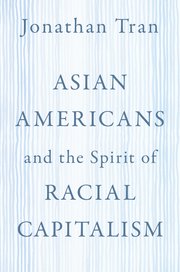 Asian Americans and the Spirit of Racial Capitalism Jonathan Tran (Oxford University Press) $35.00 OUR SALE PRICE = $28.00
Asian Americans and the Spirit of Racial Capitalism Jonathan Tran (Oxford University Press) $35.00 OUR SALE PRICE = $28.00
I have not read this thick text yet but I have it on my list — serious readers who I admire have ordered it from us and the early buzz has been significant. One person liked its importance to Willie James Jennings’ magisterial The Christian Imagination: Theologies and the Origins of Race.
Listen to what James K.A. Smith, professor of philosophy at Calvin University (and recent author of The Nicene Option: An Incarnational Phenomenology) writes of it:
This compelling book is a singular intervention in our current reckoning with racism and contemporary debates about antiracism. At once provocative and measured, Tran’s book is a feat: a careful argument that is also a bombshell. He shows us the insidious way capitalism breeds competition amongst the exploited, but also how Christian theology, in conversation with Marxism, imagines a hope beyond racial capitalism. I am still reeling from reading this.
I hope this quote from Sarah Coakley, herself a dense and important theologian, illustrates something about this important scholarly work.
Jonathan Tran’s remarkable book breaks new conceptual ground in the analysis of ‘race’, racism and religion in the United States by providing a fearless critique of how standard scripts about racial ‘identity’, even when enunciated by those who claim to be fighting injustice most emphatically, simply reinstantiate what they are claiming to overcome. The problem is that these well-meaning discourses obscure what most needs exposure: the economic substructure which keeps the problematic core racial binary in place, and at the same time relegates those who do not conform to that binary (specifically, ‘Asian Americans’) into a strange place of collusion or further marginalization. But Tran is no standard neo-Marxist, either: through a rich use of comparative ethnographic studies he is able to show how Christianity’s core meanings, when truly activated politically, can still change these narratives and also their outcomes. — Sarah Coakley, Australian Catholic University
For a really intersting review, check out this one from our friends over at the Englewood Review of Books.
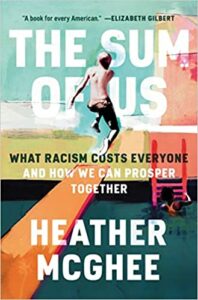 The Sum of Us: What Racism Costs Everyone And How We Can Prosper Together Heather McGhee (One World) $28.00 hardback // $20.00 paperback $18.00 OUR SALE PRICE = $22.40 (hardback) // $14.40 (paperback)
The Sum of Us: What Racism Costs Everyone And How We Can Prosper Together Heather McGhee (One World) $28.00 hardback // $20.00 paperback $18.00 OUR SALE PRICE = $22.40 (hardback) // $14.40 (paperback)
We named this as one of the Best Books of 2021 and while it is a serious read, really, truly commend it to you. Ibram X. Kendi says, boldly, “This is the book I’ve been waiting for.” Wes Moore (of the unforgettable The Other Wes Moore) says, “The beauty and power of this book is blinding.” The extraordinary George Saunders (Lincoln in the Bardo) writes that it is “vital, urgent, stirring, beautifully written.” Chris Hays assures us that “Heather McGee is one of the wisest, most penetrating, most brilliant minds to set herself to the Big Problem of American democracy.”
The Sum of Us is an exploration of the nexus of race, class, and politics. It is written with care, with kindness, with insight, and without turning away from the complex matters of economics, racism, religion, and more. It shows in significant ways not only how we got into the mess we are in; it scrupulously tells the story of how public goods –- from parks and pools to functioning schools -– have become private luxuries… And it offers healthy ways to proceed, to move towards new ground. Some of it — the “solidarity dividend,” for instance — can happen, she shows, in houses of worship.
McGhee does not say all that needs to be said and she may or may not be right in all her analysis although with expertise in economics and policy (and a law degree) I wouldn’t want to argue with her. The Sum of Us is a very important contribution, for its insight, her authority, and the power to change that could come if we heed even some of what she proposes.
Here is how the publisher describes her project:
Heather C. McGhee’s specialty is the American economy – and the mystery of why it so often fails the American public. As she dug into subject after subject, from the financial crisis to declining wages to collapsing public infrastructure, she found a common problem at the bottom of them all: racism–but not just in the obvious ways that hurt people of color. Racism has costs for white people, too. It’s the common denominator in our most vexing public problems, even beyond our economy. It is at the core of the dysfunction of our democracy and even the spiritual and moral crises that grip us. Racism is a toxin in the American body and it weakens us all. But how did this happen? And is there a way out? To find the way, McGhee embarks on a deeply personal journey across the country from Mississippi to Maine, tallying up what we lose when we buy into the zero-sum paradigm–the idea that progress for some of us must come at the expense of others. Along the way, she collects the stories of white people who confide in her about losing their homes, their dreams and their shot at a better job to the toxic mix of American racism and greed.
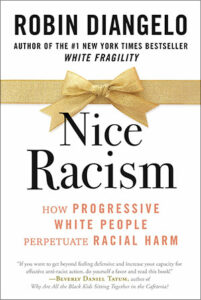 Nice Racism: How Progressive White People Perpetuate Racial Harm Robin Diangelo (Beacon Press) $24.95 OUR SALE PRICE = $19.96
Nice Racism: How Progressive White People Perpetuate Racial Harm Robin Diangelo (Beacon Press) $24.95 OUR SALE PRICE = $19.96
Guess what? Maybe folks had had enough of these kinds of books by the time this book released in the summer of 2021 or maybe some had heard (sometimes fairly legitimate, in my view) critiques of Diangelo’s huge seller, White Fragility. I am not sure if it didn’t sell well elsewhere, but my hunch is this is a sleeper — important, slowly gaining respect, a lesser known but significant resource. It shows that good intentions simply are not enough.
Just listen to these serious recommendations:
With the hard-earned insights that come from years of study and leading workshops on racism, Robin DiAngelo captures the strategies often used by well-intentioned white people to avoid the self-examination needed to confront their own unrecognized racism. If you want to get beyond feeling defensive and increase your capacity for effective anti-racist action, do yourself a favor and read this book! — Beverly Daniel Tatum, author of Why Are All the Black Kids Sitting Together in the Cafeteria? And Other Conversations About Race
In this illuminating follow-up to White Fragility, Robin DiAngelo integrates sharp insight, personal vulnerability, and compassionate guidance with the keen eye of an ‘insider.’ Focusing specifically on the more subtle patterns of white progressives, her work continues to be invaluable to the project of ending white supremacy. — Resmaa Menakem, author of My Grandmother’s Hands: Racialized Trauma and the Pathway to Mending Our Hearts and Bodies
Spectacular! With the precision of a social scientist, Robin DiAngelo dissects and puts under the microscope seemingly benign ‘white moves’ — including her own — in ways that make undeniable how each functions to recalibrate white dominance and comfort again and again. A critical tool for white progressives wanting to know better so we can do better. — Debby Irving, author of Waking Up White and Finding Myself in the Story of Race
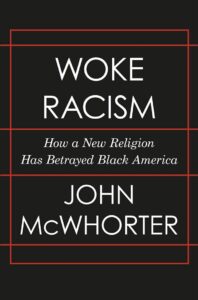 Woke Racism: How a New Religion Has Betrayed Black America John McWhorter (Portfolio/Penguin) $28.00 OUR SALE PRICE = $22.40
Woke Racism: How a New Religion Has Betrayed Black America John McWhorter (Portfolio/Penguin) $28.00 OUR SALE PRICE = $22.40
I have read other books by the provocative, brilliant, black professor of linguistics and have found him exceptionally erudite and entertaining. He has written about language, about truth, about hip-hop and rap, about “words from the gutter.” I am not sure I understand him fully, always, and I know I do not agree with him on some points. Still, for those wanting a thoughtful reply to some of the excesses of lefty woke platitudes, this is a very valuable resource.
He notes, by the way, in the opening pages, what the book is not. It is not against BLM, it is not against protest, it is certainly not against civil rights or the struggle for justice. He is worried about a religion-like ideology that he says, has seduced “New York Times-reading, National Public Radio-listening people who have innocently fallen under the impression that pious, unempirical virtue signaling about race is a form of moral enlightenment and political activism.” He continues that he is “of this world. I read The New Yorker, I have two children, I saw Sideways. I loved both The Wire and Parks and Recreation.” Well, then.
McWhorter has some bones to pick with Robin DiAngelo, Ta-Nehisi Coates, and Ibram X. Kendi. This is interesting, perhaps serving in a way Shelby Steele did twenty years ago. If your don’t think you need it, you maybe do. If your cheering, fine — but pick up one of the others on this list, too, to compare and contrast. They are all 20% off, ya know!
Here is a nice summary of an NPR review that explores the book fairly, I think. I suppose Dr. McWhorter might think this critique might prove his point, but this review sees nothing good about it at all.
BOOKS THAT POINT WAYS TO CHANGE, HEALING AND HOPE
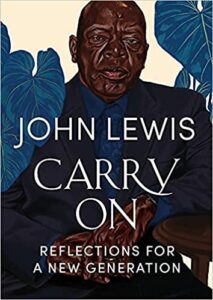 Carry On: Reflections for a New Generation John Lewis (Grand Central Publishing) $22.00 OUR SALE PRICE = $17.60
Carry On: Reflections for a New Generation John Lewis (Grand Central Publishing) $22.00 OUR SALE PRICE = $17.60
It seems like cultural ages ago when the fine Christian statesman and veteran civil rights leader was honored in DC, resting in state in the US Capitol. We have enjoyed selling the three part graphic novel / comic style autobiographies (March, Parts One, Two and Three.) As a leader in SNCC he was arrested (and often abused) more than 40 times; he served in Congress for 38 years.
Carry On is a collection of his pithy paragraphs, good words, stories, sermons, speeches, sort of a page-a-day inspirational reader, a keep-sake reader of one of the great men of our times. A very nice book covering topics from gratitude to humility, mentors to activism, faith, hope, love.
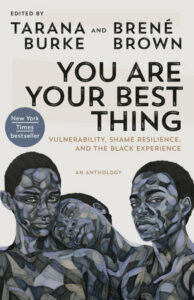 You Are the Best Thing: Vulnerability, Shame Resilience, And the Black Experience: An Anthology edited by Tarana Burke & Brene Brown (Random House) $27/00 (hardback) // $17.00 (paperback) OUR SALE PRICES = $21.60 (hardback) // $13.60 (paperback)
You Are the Best Thing: Vulnerability, Shame Resilience, And the Black Experience: An Anthology edited by Tarana Burke & Brene Brown (Random House) $27/00 (hardback) // $17.00 (paperback) OUR SALE PRICES = $21.60 (hardback) // $13.60 (paperback)
Perhaps you will recall our highlighting this when it came out in hardback — what a powerful anthology this is, excerpts of essays, articles, testimonials, studies, and reflections on African American resilience. For years, both Tarana Burke and Brene Brown have been working, writing, and talking about shame resilience and empathy, both in the context of Tarana Burke’s “me too” movement and through Brown’s research. That they have created a space for black writers to explore and process the trauma of white supremacy and offer “a space to be vulnerable and affirm the fullness of black life and black possibility” makes this a fabulous book to have, to read, to share. Burke says she wants this resources “to be a soft place to land.”
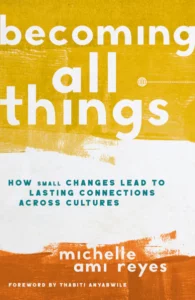 Becoming All Things: How Small Changes Lead to Lasting Connections Across Cultures Michelle Ami Reyes (Zondervan Reflective) $22.99 OUR SALE PRICE = $18.39
Becoming All Things: How Small Changes Lead to Lasting Connections Across Cultures Michelle Ami Reyes (Zondervan Reflective) $22.99 OUR SALE PRICE = $18.39
This book is outstanding. The rave reviews and commending blurbs by amazingly respected cross-cultural Christian leaders such as Soong-Chan Rah, Osheta Moore, Irwin Ince, Christiana Edmundson and Dorena Williamson indicate that Becoming All Things is one of the most important books of the season. It is a road map, a guide book, a fine and practical resource from one who is considered, by everyone who knows her, a gifted and talented teacher and impeccable leader. The lovely forward by Rev. Thabiti Anyabwile illustrates its fine evangelical clarity.
Michelle Ami Reyes, PhD, is an Indian American writer, speaker, and activist whose work on faith and culture has been featured in Christianity Today, Faithfully Magazine, Patheos, and more. She is also the Vice President of the Asian American Christian Collaborative and Editorial Director at Pax. Michelle lives in Austin, Texas with her husband, Aaron, and two kids.
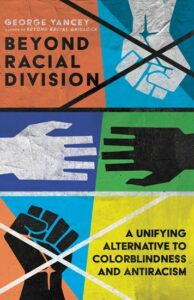 Beyond Racial Division: A Unifying Alternative to Colorblindness and Antiracism George Yancey (IVP) $18.00 OUR SALE PRICE = $14.40
Beyond Racial Division: A Unifying Alternative to Colorblindness and Antiracism George Yancey (IVP) $18.00 OUR SALE PRICE = $14.40
Oh my, a new book by black sociologist George Yancey is always notable and this brand new one looks extraordinary. You may know that he has done scholarly work on ideological bias in the culture wars, on the allegations made by conservative Christians about discrimination in the public square, about racial tensions on college campuses, on inter-racial marriages, on multi-ethnic churches. His academic books have appeared on Oxford University Press, Routledge, Baylor University Press and the like. He’s done popular-level work, too, offering wonderful resources such as One Body One Spirit and the very interesting 2006 Beyond Racial Gridlock. He always is a voice to listen well to, a voice that tends not to be easily pigeonholed.
Here is uses an admittedly simple rubric, but it may be generative, a wise call for somewhat of a third way beyond our impasses in this essential conversation and movement. For Yancey’s purposes here, “Colorblindness ignores the realities of race and the history of injustice. On the other hand, antiracism centers racial concerns and in so doing often alienates people who need to be involved in the process.” Here, he offers an approach where “all parties contribute and are mutually accountable to one another for societal wellbeing.” As he explains, this work is too important to settle for the impasse; we simply have to find ways to talk to and listen to each other for the sake of justice for all.
Listen to his good friend and colleague (and occasional co-writer) Michael O. Emerson, author of the still essential Divided By Faith:
Our racial division and inequality are extreme. In the midst of such challenges, we shout, we accuse, we point fingers, we divide into camps. And we get nowhere. Dr. Yancey proposes an alternative, rooted deeply in Christian understanding and sociological knowledge. He offers hope and clarity for our times. A must-read. — Michael O. Emerson, professor and head of the sociology department at the University of Illinois Chicago and coauthor of Divided by Faith: Evangelical Religion and the Problem of Race in America
There is not a more theologically sound, empirically informed, well-reasoned, or rational voice addressing the complexities of race, class, and culture in America today than that of Dr. George Yancey. In Beyond Racial Division, he navigates nuance and effectively challenges readers to get beyond rhetoric to results in their engagement of diverse others. As did Christ with arms outstretched, Yancey herein seeks to unite motivations and to hold Christ-followers in tension so that we might walk a more productive path for the sake of the gospel, and in so doing lead others away from painful polarization, beyond the crippling distinctions of this world that otherwise divide. — Mark DeYmaz, President of the Mosaix Global Network, author of Building a Healthy Multi-Ethnic Church
If you are well along in this journey, you know this author, I bet, and you will want to get this book. If you are somewhat new to the conversation, perhaps a bit anxious about it all, it is truly a must-read. It is not the final word, but it is a very good start to getting us out of ruts and into an honorable, faithful commitment to deepened responsibility and agency. Why not get this for your next book club or small group or buy it for your church library?
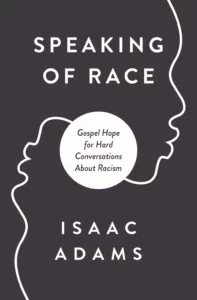 Talking About Race: Gospel Hope for Hard Conversations Isaac Adams (Zondervan Reflective) $18.99 OUR SALE PRICE = $15.19
Talking About Race: Gospel Hope for Hard Conversations Isaac Adams (Zondervan Reflective) $18.99 OUR SALE PRICE = $15.19
When the brilliant Baylor prof and highly respected author and literary critic Alan Jacobs says a book is “sober and strong, wise and practical” what more do you need to compel you to pick it up? Talking About Race is, according to Rebecca McLaughlin (author of Confronting Christianity) a “prayer-soaked, Jesus-honoring, biblically-grounded kick start to better conversations about race.”
Adams had been a pastor at the conservative, DC-area church Capitol Hill Baptist but is now lead pastor of a congregation in Birmingham. He is the founder of United? We Pray, a ministry devoted to praying about racial strife. He offers his call to gospel centered hope with (as Laura Wifler puts it) “gentleness, wisdom, and pastoral care.”
It is always proper and salutary to pray, to root our ideas in the central goodness of God’s grace in Christ, formulated in light of clear Bible teaching. I hope you know what I mean when I say that there are some people who will never enter this conversation — talking about race, as the author puts it — and will be suspicious or dismissive of a public theology with a social ethic unless it is rooted in a piety like this. This is a book to give to folks like that and (who knows?) it could be just the open door they need to learn to care about race and racism and how it violates God’s will.
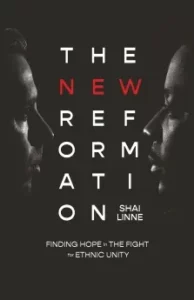 The New Reformation: Finding Hope in the Fight for Ethnic Unity Shai Linne (Moody Press) $15.99 OUR SALE PRICE = $12.79
The New Reformation: Finding Hope in the Fight for Ethnic Unity Shai Linne (Moody Press) $15.99 OUR SALE PRICE = $12.79
You may know Shai Linne as a hip hop recording artist and his conventional, Reformed Baptist theology which comes through his spoken word work. He has come out of (and has returned to) his hometown of Philadelphia, PA and is known in conservative theological circles and edgy, urban ministry circles.
Here he is riffing off his beloved reformation truths — the back cover assures us he loves the five solas — but invites us to this new, diverse, unified community. He truly lives for the glory of God and he offers this broad vision of ethnic and cultural reconciliation. Nicely co-produced by the record label humble beast.
By the way, Shai Linne’s wife, Blair, recently released a moving memoir full of gospel hope, Finding My Father: How the Gospel Heals the Pain of Fatherlessness (The Good Book Company; $16.99.)
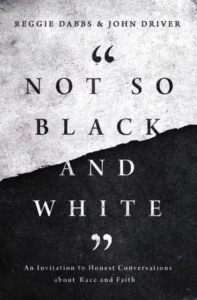 Not So Black and White: An Invitation to Honest Conversation About Race and Faith Reggie Dabbs & John Driver (Zondervan) $18.99 OUR SALE PRICE = $15.19
Not So Black and White: An Invitation to Honest Conversation About Race and Faith Reggie Dabbs & John Driver (Zondervan) $18.99 OUR SALE PRICE = $15.19
These sorts of books — honest conversations between a black guy and a white guy — are not uncommon not, and I’ve read several. Some are really raw and honest, some are pretty theological, some not that interesting. This one looks to be really solid, honest and astute, showing, as one reviewer put it, “what real dialogue can look like.” These guys are theologically driven, deeply spiritual within the evangelical church movement, but reaching beyond that context. Reggie Dabbs happens to be a very sought-after public school speaker (sharing his own story of tragedy and redemption and hope) and Driver (who has written bunches of books with others) is a former history teacher who is now a pastor at a church in Nashville.
In this impressive project they hope to equip black and white Christians to come together and fight the evils of racism “within our heart and within our systems.” They hope readers will hear stories of those who have found ways to reach across the racial barriers by learning to listen well, come to a “simple but robust” history of racism and learn to respond to the challenges of racism in your community. As the back cover promises, they help us “identify practical steps to engage bravely in conversations and actions to end racism.”
This book is an answer to prayer. Reggie and John walk the tightrope between honesty and hope as well as I’ve seen in this conversation. — John Onwuchewka, pastor, Cornerstone Church, Atlanta
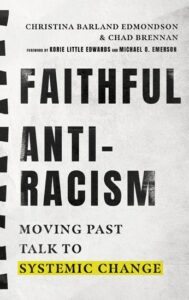 Faithful Anti-Racism: Moving Past Talk to Systemic Change Christina Barland Edmondson & Chad Brennan (IVP) $25.00 OUR SALE PRICE = $20.00
Faithful Anti-Racism: Moving Past Talk to Systemic Change Christina Barland Edmondson & Chad Brennan (IVP) $25.00 OUR SALE PRICE = $20.00
I must say that this is one of the books I have been most eager to see, most eager to read, and most eager to promote. If my hunch is right about this, it will be one of the major books in their field for several years to come. The authors have much to teach us and are excellent thinkers and communicators with lots of experience helping Christians of all sorts move beyond talk alone and work to dismantle the deep-seated racism in our lives, churches, and society. Those who feel ill equipped to respond well will appreciate the careful title — this is an invitation to explore faithful anti-racism, that is, a sort inspired by Christ, informed by the Bible, shaped by our best theological truths. They proceed with care but with confidence in the promise of Jesus.
Two very quick comments which I hope help persuade you to pick this up soon.
Firstly, Christian Edmondson is an influential leader, a cohost of the exceptional Truth’s Table podcast and many who admire her have been eagerly awaiting her book. She has several advanced degrees (including in family counseling) and is a mental health therapist; She has served in a variety of roles in higher education including as the Dean for Intercultural Student Development at Calvin University. She is a certified Cultural Intelligence facilitator, public speaker, and a consultant in the areas of ethics, equity, and Christian leadership development. As a strong Christian leader she has written a sophisticated book that her colleague Kristen Kobes Du Mex says “is a gift to the American church.”
Secondly, Chad Brennan is founder of Renew Partnerships, a Christian research and consulting ministry that focuses on diversity and race in faith-based organizations. He is a coordinator of the Race, Religion, and Justice Project founded by Michael Emerson and this new book presents what some are saying is the most comprehensive study on Christians and race since Emerson’s own research that was shared in the 2001 Divided by Faith. This fresh data has immediate use, I am sure, regardless of your context, and we should thank God for Edmondson and Brennan for bringing it to us with such clarity and grace.
Faithful Anti-racism has been called “unparalleled” as it offers what Duke Kwon calls “a brilliant synthesis of current research, scriptural insight, personal story, history analysis, and practical wisdom.”
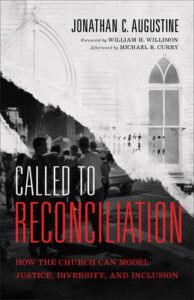 Called To Reconciliation: How the Church Can Model Justice, Diversity, and Inclusion Jonathan C. Augustine (Baker Academic) $19.99 OUR SALE PRICE = $15.99
Called To Reconciliation: How the Church Can Model Justice, Diversity, and Inclusion Jonathan C. Augustine (Baker Academic) $19.99 OUR SALE PRICE = $15.99
This is a brand new title that we are sure will be a good read for nearly anyone — written by an AME pastor with a JD from Tulane and a DMin from Duke) who is a scholar of reconciliation and an agent for helping others care for “the other.” Yes, this is an interdisciplinary study by an amazing, multi-talented preacher and professor who is a nationally recognized civil rights leader, a theologian, and black church minister.
I think one of the things about this title is that the author is not situated (as many books on reconciliation are) within the white evangelical subculture. As a black lawyer from the deep South, he knows well the demands of social righteousness and public justice. As a law school professor (at North Carolina Central University Law School) Augustine stays up to date with the details of the legal aspects of the struggle. But as a scholar and missional strategist at the legendary Duke Center for Reconciliation, he has a passion for God’s Kingdom uniting people who are at odds. This easy to read but stimulating book is a prophetic call to embrace Biblical reconciliation not as a simple, pious platitude shaped by colorblind ideology, but the hard, gospel-based work, the work of redemptive transformation.
That United Methodist Will Willimon and Episcopalian Michael Curry have essays — a forward and an afterword —in Called to Reconciliation is interesting (especially given Rev. Augustine’s role as a clergyman in the AME Church.)
With a clear-eyed realism about the ways faith has been distorted to justify white supremacy, Augustine invites the church to face the demons that still haunt our public life and to discover the resources in our tradition for a moral witness that offers humanity a future together. God, grant us wisdom to receive the vision and courage to practice it together with our neighbors. — Bishop William J. Barber II, president of Repairers of the Breach; cochair of the Poor People’s Campaign: A National Call for Moral Revival
An absolute force of a book, required reading for clergy, lay leaders, and interested citizens alike. Augustine not only makes the case for reconciliation in the church but also lays out a clear road map for anyone who wants to take a step toward inclusion but does not know how. He has done the church, and the world, a great service. — Joshua DuBois, faith-based advisor to President Barack Obama; author of The President’s Devotional
At one of the most divided times in our nation since the Civil War, Augustine pleads with believers from different groups to embrace ‘the Other’ in a mutually beneficial and diverse community. This is truly a must-read. — Barbara Williams-Skinner, co-convener, the National African American Clergy Network
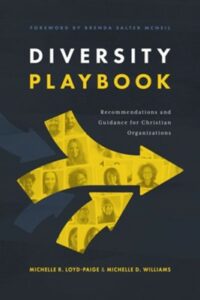 Diversity Playbook: Recommendations and Guidance for Christian Organizations Michelle R. Loyd-Paige & Michelle D. Williams (Abilene University Press) $19.99 OUR SALE PRICE = $15.99
Diversity Playbook: Recommendations and Guidance for Christian Organizations Michelle R. Loyd-Paige & Michelle D. Williams (Abilene University Press) $19.99 OUR SALE PRICE = $15.99
We have given this a shout-out on several occasions and remain confident that it will be a terrific resource for those working within Christian organizations, from colleges to para-church ministries, nonprofits and mission groups. Churches, too, frankly. We need a play book to guide us into this diversity work and section one of this one-of-a kind resource offers “wisdom for diversity professionals.” There are bunches of plans and projects, ideas and principles, visions and practices that can be applied within all sorts of social organizations. Loyd-Paige is the Executive associate to the President for Diversity and Inclusion at Calvin University (and the founder of a consulting firs providing diversity and wellness coaching services.) Rev. Michelle Williams is a writer, speaker, former seminary dean, and entrepreneur. He passion and positivity come through. This really is a timely guidebook to equip leaders, towards greater institutional commitments to creating a culture of flourishing for all.
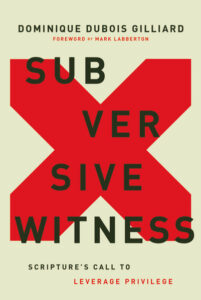 Subversive Witness: Scripture’s Call to Leverage Privilege Dominique Dubois Gilliard (Zondervan Reflective) $24.99 OUR SALE PRICE = $19.99
Subversive Witness: Scripture’s Call to Leverage Privilege Dominique Dubois Gilliard (Zondervan Reflective) $24.99 OUR SALE PRICE = $19.99
I have not reviewed this extensively but it has been one we have sold well since it came out late last summer. What a good, good, book it is! The author is a leader you should know; the book is remarkable. Latasha Morrison (who I’m sure you know from her bestselling Be the Bridge) says Gilliard is “a gift to the church.” Authors like Soong-Chan Rah and Jenny Yang and Jemar Tisby all rave.
Dominique DuBois Gilliard is a very fine writer — his first book was Rethinking Incarceration: Advocating for Justice that Restores published by IVP and it was insightful and vital. He is an ordained minister and serves as the director of racial righteousness and reconciliation for the Evangelical Covenant Church. (He is also on the Board of the Christian Community Development Association.) I simply thank God for him and his gracious commitment to Biblical righteousness in all its fullness and his kind (if frank) exploration of the privilege many of us carry and benefit from.
It is well-grounded in a Biblical perspective (and characters, from Esther to Zacchaeus) and calls us to faithful discipleship.
The forward by Mark Labberton, now President of Fuller Theological Seminary, is itself very good and sets the stage well for hearing from this black brother as he helpfully explores what we mean by privilege, how to steward it well, what it might look like to “leverage it.”
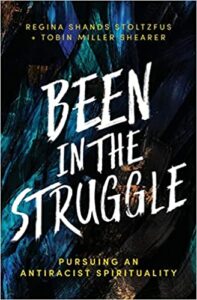 Been in the Struggle: Pursuing an Anti Racist Spirituality Regina Shands Stoltzfus & Tobin Miller Shearer (Herald Press) $18.99 OUR SALE PRICE = $15.19
Been in the Struggle: Pursuing an Anti Racist Spirituality Regina Shands Stoltzfus & Tobin Miller Shearer (Herald Press) $18.99 OUR SALE PRICE = $15.19
Well, the work of dismantling racism won’t happen overnight — which is how this realistic and patient book draws you in. It nurtures your sense of this and fosters an attitude that this work is for the long haul. There are no easy answers and we have to open ourselves to new visions and practices. Like anything, it takes time, commitment and… and… God’s help!
This book is unlike many in how it integrates within it’s justice and peace-building, anti-racist work, a tru sense of seeking the Spirit, of being guided by God, of drawing on interracial relationship “to offer a vision for an antiracist spirituality.”
We have carried and long recommended books by Shearer and we have followed Stoltzfus (a black Mennonite woman with a degree from Chicago but living in Goshen Indiana.) Both are respected anti-racist trainers and mature, wise, followers of Jesus.
For what it is worth, this truly is an embodied and lively spiritually that they are inviting us towards. It is not primarily one of quietude or contemplation and they are not drawing on sources like Richard Foster or Richard Rohr or Ruth Haley Barton. This is deeply multi-ethnic, Anabaptist, refreshing stuff.
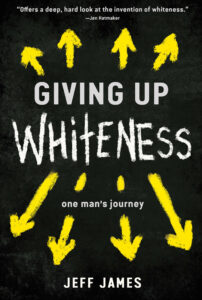 Giving Up Whiteness: One Man’s Journey Jeff James (Broadleaf) $24.99 OUR SALE PRICE = $19.99
Giving Up Whiteness: One Man’s Journey Jeff James (Broadleaf) $24.99 OUR SALE PRICE = $19.99
I’m not sure why I first picked this up — I pay attention to most Broadleaf titles, and there is a blurb on the back by Slot Welch (of Global Bridgebuilders and author of the excellent Plantation Jesus.) Also, there is a blurb on the back by young evangelical pastor and writer Jefferson Bethke, who I hadn’t expected to see here. He describes the book simply saying, “Giving Up Whiteness is a very personal and honest journey through how the idolatry of whiteness has influenced one man, but also hold powerful clues for fighting this ongoing evil.”
Who is this “one man”? He is a fascinating guy, and this story is rooted in his own faith, growing up in West Virginia, living around Philadelphia; there is a scene of him visiting Circle of Hope, a funky house church movement where I have visited and even spoken, years ago. (He attends a Damascus Road racial training event in Germantown, which is, by the way, the ministry founded by the aforementioned Regina Shands Stoltzfus & Tobin Miller Shearer.) It isn’t a straight narrative and there are helpful excursions into all manner of things James learns, but he ends up in Nashville. Is whiteness even a thing? Who came up with this stuff, anyway?
It doesn’t surprise me, but there is a great endorsement for Giving Up Whiteness by Debby Irving, author of the popular Waking Up White. Nice.
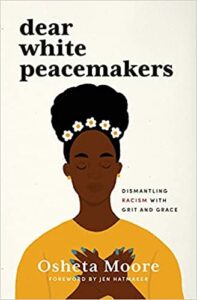 Dear White Peacemakers: Dismantling Racism with Grit and Grace Osheta Moore (Herald Press) $18.99 OUR SALE PRICE = $15.19
Dear White Peacemakers: Dismantling Racism with Grit and Grace Osheta Moore (Herald Press) $18.99 OUR SALE PRICE = $15.19
I reviewed this earlier and have spoken about it in a few Zoom talks I’ve given — I’m a fan of her wit and passion and her candor. This is stuff a lot of us well-intended folks need to consider. It really is a great read and think it would make a great book for a group read — especially if you. have some sympathies for these concerns already.
As the publisher puts it, “Written in the wake of George Floyd’s death, Dear White Peacemakers draws on the Sermon on the Mount, Spirituals, and personal stories from author Osheta Moore’s work as a pastor in St. Paul, Minnesota. Enter into this story of shalom and join in the urgent work of anti-racism peacemaking.”
Osheta Moore’s good friend, the hip hop artists and writer, Lecrae, says it is a “must read for my brothers and sister in Christ.” If you want to feel more equipped to speak into this tough topic and be faithful as an agent of reconciliation, justice and the recovery of shalom in this arena, Dear White Peacemakers is a great guide, honest and good. It covers so much ground, sometimes with hard-hitting frankness and sometimes with snark and joy. What a read.
Osheta Moore has written not only an important book, but what some may consider an impossible book. In Dear White Peacemakers, Osheta calls us to fight racism while remaining true to the peacemaking ethic set forth by Jesus in the Sermon on the Mount. This is a smart and compelling work, and Osheta’s voice is both honest and hopeful. I benefited greatly from Dear White Peacemakers.” — Brian Zahnd, lead pastor of Word of Life Church in Saint Joseph, Missouri, and author of When Everything’s on Fire
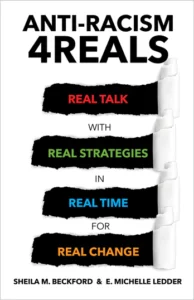 Anti-Racism 4REALS: Real Talk with Real Strategies in Real Time for Real Change Sheila Beckford & E. Michelle Ledder (Chalice Press) $17.99 OUR SALE PRICE = $14.39
Anti-Racism 4REALS: Real Talk with Real Strategies in Real Time for Real Change Sheila Beckford & E. Michelle Ledder (Chalice Press) $17.99 OUR SALE PRICE = $14.39
Chalice Press is the publishing arm of the progressive Disciples of Christ denomination and has done bunches of upbeat and usable books about public theology and social justice organizing. We have highly recommended their very assessable Anxious to Talk About It: Helping White People Talk Faithfully about Racism (now in its second edition) by Presbyterian seminary prof Carolyn Helsel. This more recent one is perhaps a second (or third) step on this journey. It shouts on the back “How can we dislodge, disrupt, and dismantle racism for real?”
Rev. Dr. Richard Hayes, pastor of the Metropolitan Community United Methodist Church says, “Antiracism 4REALS is an indispensable resource for equipping all who are serious about the work of dismantling racism.” These two women — one black Latina and one white — have years of antiracism training experience. They offer concrete tools to train you to confront racism and bring about real change.
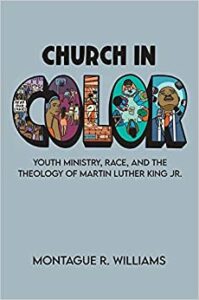 Church in Color: Youth Ministry, Race, and the Theology of Martin Luther King, Jr. Montague R. Williams (Baylor University Press) $44.95 OUR SALE PRICER = $35.96
Church in Color: Youth Ministry, Race, and the Theology of Martin Luther King, Jr. Montague R. Williams (Baylor University Press) $44.95 OUR SALE PRICER = $35.96
Although this is one of those academic, peer-reviewed, scholarly books (with the salty price tag to match) the goofy cover maybe suggests it is casual or super-hip. You should know it is a major work, a serious study, a remarkable read by an incredibly talented young scholar. The author is, interestingly, a Church of the Nazarene guy, now a prof at Point Loma, teaching “Church, Culture, and Society.” He’s got a PhD from Boston University and his study in Church in Color of the future of intergenerational youth ministry in our racialized culture, is extraordinary. Strong black voices like Daniel White Hodge rave about it, as does Abigail Visco Rusert, the Director of the Institute for Youth ministry at Princeton Seminary and Andrew Root who says, “this is a book I’ll be assigning for classroom use.”
Can youth help us with our theological projects? Can they bring their “whole, embodied selves to the Beloved Community?” Can we imagine a fresh ecclesial vision that includes post-millennials with their experience of cultural diversity as a given?
Lewis Baldwin, a Vanderbilt prof and King scholar, says Church in Color is a “clarion call to action.” Dr. Williams knows King’s work well, invites us to draw on its wisdom, and apply it to a multi-ethnic vision of the church as it applies, especially to youth ministry and the role of teens in our faith communities. What a book.
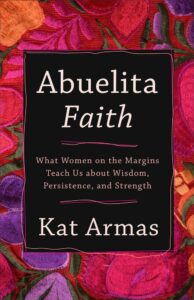 Abuelita Faith: What Women on the Margins Teach Us About Wisdom, Persistence, and Strength Kat Armas (Brazos Press) $17.99 OUR SALE PRICE = $14.39
Abuelita Faith: What Women on the Margins Teach Us About Wisdom, Persistence, and Strength Kat Armas (Brazos Press) $17.99 OUR SALE PRICE = $14.39
We reviewed this when it came out early in 2021 — it seems like a long time ago — and yet, this book is still growing in popularity as more people discover its fabulous appreoach. A Latina woman inviting us to study women in the Bible alongside testimonies and memoir of the author and her family. She makes the case that mothers, grandmothers, sisters, and daughters have something to teach us all, and have something vital to offer the project of doing faithful, relevant theology. As Sandra Van Opstal puts it, “Kit Armas masterfully integrates biblical truth with social reality.”
In this sense, it sits on the shelf next to Hermanas: Deepening Our Identity and Growing Our Influence by Natalia Kohn Rivera, Noemi Vega Quiñones, and Kristy Garza Robinson (IVP; $17.00) which we have often listen. Hermanas primarily looks at Biblical women in light of the experiences of these women while Abuelita Faith by Armas is a bit broad, more social analysis, more story and moret heological rumination, I think, but they both wonderfully bring the voices of brown women into the foreground.
Armas demonstrates that powerful named and unnamed women, who through the quotidian have affected the outcome of history, fill not only the Bible but also our lives. Let us sit at Armas’s feet that we might gain the wisdom we so desperately need to embody abuelita faith ourselves.
— Marlena Graves, author of The Way Up Is Down: Becoming Yourself by Forgetting Yourself
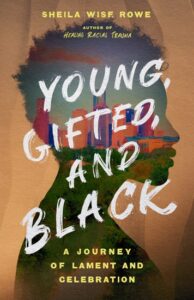 Young, Gifted and Black: A Journey of Lament and Celebration Sheila Wise Rowe (IVP) $18.00 OUR SALE PRICE = $14.40
Young, Gifted and Black: A Journey of Lament and Celebration Sheila Wise Rowe (IVP) $18.00 OUR SALE PRICE = $14.40
Many BookNotes friends have greatly appreciated Sheila Wise Rowe’s previous book, the honest and very important Healing Racial Trauma. This new one is very interesting and inspiring — even for me, a guy who is neither young nor back, and not all that gifted, either, for that matter. But I get the reference from Nina Simone. Here Rowe goes beyond the more common story that focuses on the success or struggle of black millennials and young adults and, rather, offers themes of celebration and lament, pointing towards hope, joy, and healing. It is a book quite intentionally written to be of encouragement for younger black readers — although it is helpful for others to listen in, learning from what Rowe has learned over her years as a therapist, listening well to those who have experienced great sadness and great joy.
The title alludes to a famous anthem from the civil rights movement from Nina Simone. Three cheers for Young, Gifted, and Black and praise God for Sheila Wise Rowe. Highly recommended.
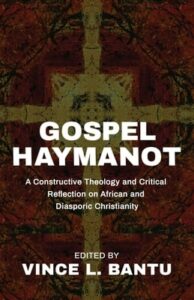 Gospel Haymanot: A Constructive Theology and Critical Reflection on African and Diaspora Christianity edited by Vincent L. Bantu (Urban Ministries, Inc.) $25.00 OUR SALE PRICE = $20.00
Gospel Haymanot: A Constructive Theology and Critical Reflection on African and Diaspora Christianity edited by Vincent L. Bantu (Urban Ministries, Inc.) $25.00 OUR SALE PRICE = $20.00
You may know Dr. Bantu for his work in the serious IVP volume A Multitude of All People: Engaging Ancient Christianity’s Global Identity. He is a professor of Church History and Black Church Studies at Fuller Theological Seminary and has a leadership role in the Meachum School of Haymanot and the Society of Gospel Haymanot. His expertise is brilliant and here he has edited a volume which forges new paradigms for evangelical black theology and public witness.
As it says on the back cover, “Through seven dominant voices in Black academic theology, Gospel Haymanot sheds new light on biblical authority issues, doctrinal orthodoxy, and evangelical theology on justice and liberation, which engage the Black Christian experience.”
If you know any black academics (or anyone in the broader church seeking “biblical orthodoxy and black liberation”) this is an important rare resource. Contributing scholars are Quonekuia Day, Cleotha Robertson, Dennis Edwards, Vince Bantu, Nicholas Rowe, Vincent Bacote and Jacqueline T. Dyer.) The forward, insisting it is a very important book, comes from the honorable Dr. William Pannell, professor emeritus, Fuller Theological Seminary. Bill Pannell was the first black speaker I ever heard, I think, and was transformative for me, at the first CCO conference which I attended as a college kid in 1973, an event that eventually became Jubilee. Dr. Bantu did a special “Jubilee Africana” presentation the Friday night of Jubilee 2022. Our CCO friends were thrilled.
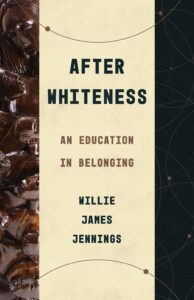 After Whiteness: An Education in Belonging Willie James Jennings (Eerdmans) $19.99 OUR SALE PRICE = $15.99
After Whiteness: An Education in Belonging Willie James Jennings (Eerdmans) $19.99 OUR SALE PRICE = $15.99
I suppose it is fair to say that there are some of us who found Jennings often cited The Christian Imagination: Theology and the Origins of Race (perhaps alongside Race by Cameron Carter) a bit much. It is serious, dense, and a bit thick. And expensive, on Yale University Press. Granted.
After Whiteness is a short read, colorful and assessable, a study of how seminary education might be construed and re-construed “after whiteness.” It is the inaugural volume of a series started by Eerdmans called “Theological Education Between the Times” (and for or five have come out in the last two years, almost all by people of color, each creative writing about how we might do theology and, specifically, theological education, differently in these times.
If you loved Jennings’s The Christian Imagination you most likely already picked up After Whiteness as soon as it came out last year. We sold a few and it was exciting for us. Perhaps you are one who haven’t gotten around to his bigger volume — if so, this one might serve you well as a way to read something of this important voice and understand his fundamental critique of how there have been great distortions in theology due to whiteness (and its related constructs of masculinity and rugged individualism.)
Drawing on the likes of Saint Augustine and his work on desire (eros) Jennings calls for an erotic theology, for a sense of soul that “denotes the power and energy of authentic connection with God and our fellow human beings.”
This is a powerful little book, potent, provocative, challenging, transgressive, even.
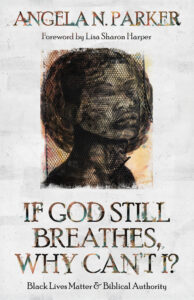 If God Still Breathes, Why Can’t I? Black Lives Matter & Biblical Authority Angela N. Parker (Eerdmans) $16.99 OUR SALE PRICE = $13.59
If God Still Breathes, Why Can’t I? Black Lives Matter & Biblical Authority Angela N. Parker (Eerdmans) $16.99 OUR SALE PRICE = $13.59
For those of us in ecumenical conversations, and certainly for us situated here in our bookstore where we serve all sorts of readers from all sorts of faith perspectives, we know that the discussions about the role and authority and inspiration of the Bible are endless. And, often, not terribly insightful, generating more heat than light. I’m reluctant to add more to those “battles for the Bible” even though I think it is important to read about, to consider and ponder and take the question seriously. I often note — and I will again here — that sometimes those with the most rigorously developed and loudly insisted upon view of the authority of the Bible don’t, in my estimation, live in a way that indicates that they take their Bibles all that seriously anyway. And some who on some days say less than ideal things about the Bible end up being the ones who invite us to stake our very lives upon its vision and promises. Even Jesus warned about this — you remember: the one kid who said he would do the father’s bidding, but doesn’t, and the other, who didn’t say he would, but actually did. So, there’s that.
So it is vexing, but since I’m listing books here that are in many ways knowingly provocative, thought-provoking, challenging and stimulating, let me suggest this, a “challenge to the doctrine of biblical inerrancy that questions how Christians are taught about the way of Whiteness than the way of Jesus.”
How Professor Parker (who teaches New Testament Greek, by the way, at Mercer University’s McAfee School of Theology) deconstructs white evangelicalism is one good thing. How she relates that to her critique of a toxic authoritarianism that is linked to doctrines of infallibility is interesting and will be compelling for many. (The wise Brenda Salter McNeil highly recommends it!) There are those who will insist that if we are to reframe and understand the Scriptures rightly as texts of social righteousness, offering visions of justice and inclusion, we must value them highly as the Word of God that they are said to be and that Parker seems to be unclear about that. If they are not divinely inspired, then why bother to discern if their vision is egalitarian or not?
But, of course, it isn’t that simple — there are ways to honor the holy breath/inspiration of the Bible without holding to a wooden inerrancy; we can come around God’s Word in reformational ways that are not authoritarian or toxic, not essentially connected to white patriarchy. This, generally speaking, is a remarkable urgent project.
Dr. Parker brings the womanist ethic of resisting racism and sexism to her reconsidering the role of Biblical studies and faithful discipleship and it is passionate and insightful. She is, of course, insisting that our lived experience, our embodied identities will shape our hermeneutic, that we (always) engage the sacred texts as real people in real bodies and in real cultures and we need to acknowledge that. It is exciting, stimulating, a bit scary.
Listen to Lisa Sharon Harper, author of The Very Good Gospel and, recently, Fortune: How Race Broke My Family and the World — And How to Repair It All, who wrote this in the forward:
What does it mean to follow Jesus when we strip Whiteness and westernness from his skin and the Brown colonized context from which he rose? What happens when those at the bottom read the words of those at the bottom? What suppressed, covered over, hidden, and obliterated meanings rise again? That is the project of the next five hundred years. Angela Parker’s If God Still Breathes takes us one step further on the journey.
I’ve been waiting for this book! If God Still Breathes, Why Can’t I? brings a fresh perspective to the biblical text that makes it come alive with hope of liberation for all people. Dr. Angela Parker calls us past the superficial into a deep engagement with a contextual theology that is relevant and life-giving. We must rethink how to address the racial and social injustices taking place in the world today, and I am convinced that the way forward is womanist! So if you want to become brave enough to move from being a concerned bystander to an active participant — this book is for you! I highly recommend it. — Brenda Salter McNeil, author of Becoming Brave: Finding the Courage to Pursue Racial Justice Now
Kudos to the publishers and their authors who have brought these sorts of hard hitting and even controversial books to the marketplace. For some, this comes with considerable risk of losing customers, losing limited funds. We feel that, too, sometimes, but — golly, if publishers can spend as much as they do bringing these kinds of voices and topics into the world, the least we can do is try to sell a few. Will you join us in this project, deepening our journey into understanding? Thanks for reading!
TO PLACE AN ORDER
PLEASE READ THESE REMINDERS AND THEN CLICK ON THE “ORDER” LINK BELOW.
It is helpful if you would tell us how you prefer us to ship your orders. The weight and destination of your package varies but you can use this as a general guide.
There are generally two kinds of US Mail options, and, of course, UPS. If necessary, we can do overnight and other expedited methods, too. Just ask.
- United States Postal Service has the option called “Media Mail” which is cheapest but slow and may be delayed. For one book, usually, it’s about $3.50.
- United States Postal Service has another option called “Priority Mail” which is $8.35 if it fits in a flat rate envelope. Many children’s books and some Bibles are oversized so that will take the next size up with is $8.95. “Priority Mail” gets much more attention than does “Media Mail” and is often just a few days to anywhere in the US.
- UPS Ground is reliable but varies by weight and distance and may take longer than USPS. We’re happy to figure out your options for you once we know what you want.
– DON’T FORGET TO LET US KNOW WHAT SHIPPING METHOD YOU PREFER –
HELPFUL HINT: If you want US Mail, please say which sort — Media Mail or Priority Mail — so we know how to serve you best. If you say USPS or “regular” we’re left scratching our noggins.
BookNotes

SPECIAL
DISCOUNT
20% OFF
ALL BOOKS MENTIONED
this takes you to the secure Hearts & Minds order form page
just tell us what you want to order
if you have questions or need more information
just ask us what you want to know
Hearts & Minds 234 East Main Street Dallastown PA 17313
read@heartsandmindsbooks.com
717-246-3333
It is complicated for us, but we are still closed for in-store browsing due to our commitment to public health and the common good (not to mention the safety of our staff and customers.) The vaccination rate here in York County is sadly lower than average and the hospitals are still crowded. Our store is a bit cramped without top-notch ventilation so we are trying to be wise and faithful.
Please, wherever you are, do your best to be sensitive to those who are most at risk.
We are doing our famous curb-side customer service and can show any number of items to you if you call us from our back parking lot. We are eager to serve and grateful for your patience as we all work to mitigate the pandemic.
Of course, we’re happy to ship books anywhere. Just tell us how you want them sent.
We are here 10:00 – 6:00 EST / Monday – Saturday, closed on Sunday.
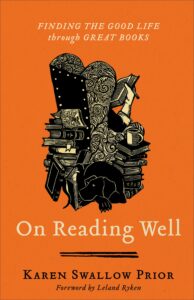 Press.) Still enhanced with those fabulous linocuts by our friend Ned Bustard, it just came out in paperback (now $19.99.) At that event, Karen explained the thesis of the book — that reading classic literature can not only be entertaining and interesting and edifying, but can actually help form within us Christian virtues. The book has sold well and many have loved it. In it, she famously linked a certain classic novel with a certain virtue. It’s what I playfully sometimes call a “two-fer” — you learn both about virtue/character formation and you learn a Christian view of reading. You could even call it a three-fer” because you also learn the basic plot lines and themes of a dozen great works, from Austen to Dostoevsky to Melville to Dickens.
Press.) Still enhanced with those fabulous linocuts by our friend Ned Bustard, it just came out in paperback (now $19.99.) At that event, Karen explained the thesis of the book — that reading classic literature can not only be entertaining and interesting and edifying, but can actually help form within us Christian virtues. The book has sold well and many have loved it. In it, she famously linked a certain classic novel with a certain virtue. It’s what I playfully sometimes call a “two-fer” — you learn both about virtue/character formation and you learn a Christian view of reading. You could even call it a three-fer” because you also learn the basic plot lines and themes of a dozen great works, from Austen to Dostoevsky to Melville to Dickens.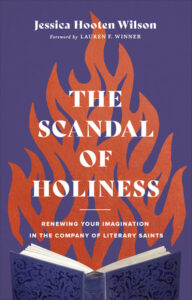 The Scandal of Holiness: Renewing Your Imagination in the Company of Literary Saints Jessica Hooten Wilson (Brazos Press) $24.99 OUR SALE PRICE = $19.99
The Scandal of Holiness: Renewing Your Imagination in the Company of Literary Saints Jessica Hooten Wilson (Brazos Press) $24.99 OUR SALE PRICE = $19.99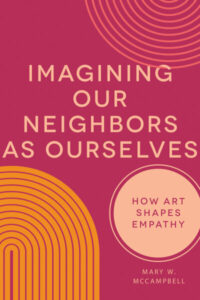 Imagining Our Neighbors As Ourselves: How Art Shapes Empathy Mary W. McCampbell (Fortress Press) $28.00 OUR SALE PRICE = $22.40
Imagining Our Neighbors As Ourselves: How Art Shapes Empathy Mary W. McCampbell (Fortress Press) $28.00 OUR SALE PRICE = $22.40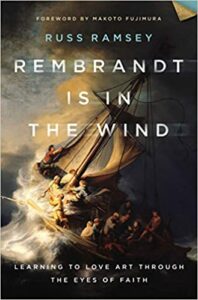 Rembrandt Is in the Wind: Learning to Love Art Through the Eyes of Faith Russ Ramsey (Zondervan Reflective) $24.99 OUR SALE PRICE = $19.99
Rembrandt Is in the Wind: Learning to Love Art Through the Eyes of Faith Russ Ramsey (Zondervan Reflective) $24.99 OUR SALE PRICE = $19.99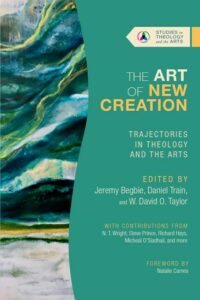 The Art of New Creation: Trajectories in Theology and the Arts edited by Jeremy Begbie, Daniel Train, and W. David O. Taylor (IVP Academic) $30.00 OUR SALE PRICE = $24.00
The Art of New Creation: Trajectories in Theology and the Arts edited by Jeremy Begbie, Daniel Train, and W. David O. Taylor (IVP Academic) $30.00 OUR SALE PRICE = $24.00

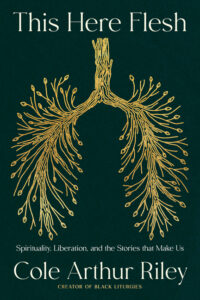 This Here Flesh: Spirituality, Liberation, and the Stories That Make Us Cole Arthur Riley. (Convergent) $26.00
This Here Flesh: Spirituality, Liberation, and the Stories That Make Us Cole Arthur Riley. (Convergent) $26.00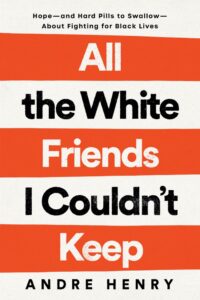 All The White Friends I Couldn’t Keep Andre Henry (Convergent) $26.00
All The White Friends I Couldn’t Keep Andre Henry (Convergent) $26.00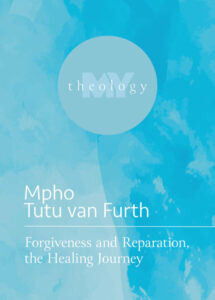 Forgiveness and Reparation, the Healing Journey Mpho Tutu van Furth (Fortress) $12.75 OUR SALE PRICE = $10.20
Forgiveness and Reparation, the Healing Journey Mpho Tutu van Furth (Fortress) $12.75 OUR SALE PRICE = $10.20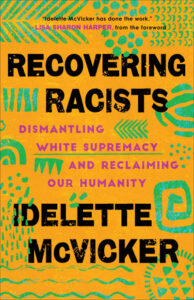 Recovering Racists: Dismantling White Supremacy and Reclaiming Our Humanity Idelette McVicker (Brazos Press) $18.99
Recovering Racists: Dismantling White Supremacy and Reclaiming Our Humanity Idelette McVicker (Brazos Press) $18.99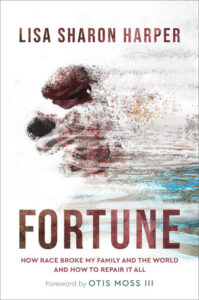 Fortune: How Race Broke My Family and the World —and How to Repair It All Lisa Sharon Harper ( Brazos Press) $24.99
Fortune: How Race Broke My Family and the World —and How to Repair It All Lisa Sharon Harper ( Brazos Press) $24.99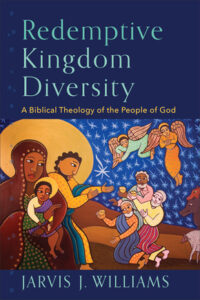 Redemptive Kingdom Diversity: A Biblical Theology of the People of God Jarvis J.Williams (Baker Academic) $24.99
Redemptive Kingdom Diversity: A Biblical Theology of the People of God Jarvis J.Williams (Baker Academic) $24.99 Four Hundred Souls: A Community History of African America, 1619 – 2019
Four Hundred Souls: A Community History of African America, 1619 – 2019 The Ledger and the Chain: How Domestic Slave Traders Shaped America Joshua D. Rothman (Basic Books) $35.00
The Ledger and the Chain: How Domestic Slave Traders Shaped America Joshua D. Rothman (Basic Books) $35.00 How the Word is Passed: A Reckoning with the History of Slavery Across America Clint Smith (Little Brown) $29.00
How the Word is Passed: A Reckoning with the History of Slavery Across America Clint Smith (Little Brown) $29.00 All That She Carried: The Journey of Ashley’s Sack, A Black Family Keepsake Tina Miles (Random House) $18.99
All That She Carried: The Journey of Ashley’s Sack, A Black Family Keepsake Tina Miles (Random House) $18.99 The Ground Breaking: An American City and Its Search for Justice
The Ground Breaking: An American City and Its Search for Justice Shaking the Gates of Hell: A Search for Family and Truth in the Wake of the Civil Rights Revolution John Archibald (Knopf) $28.00
Shaking the Gates of Hell: A Search for Family and Truth in the Wake of the Civil Rights Revolution John Archibald (Knopf) $28.00 The Myth of Colorblind Christians: Evangelicals and White Supremacy in the Civil Rights Era Jesse Curtis (New York University Press) $32.00
The Myth of Colorblind Christians: Evangelicals and White Supremacy in the Civil Rights Era Jesse Curtis (New York University Press) $32.00 Witnessing Whiteness: Confronting White Supremacy in the American Church Kristopher Norris (Oxford University Press) $28.95
Witnessing Whiteness: Confronting White Supremacy in the American Church Kristopher Norris (Oxford University Press) $28.95 Long Time Coming: Reckoning with Race in America Michael Eric Dyson (St. Martin’s Press) $25.99
Long Time Coming: Reckoning with Race in America Michael Eric Dyson (St. Martin’s Press) $25.99 White Borders: The History of Race and Immigration in the United States from Chinese Exclusion to the Border Wall
White Borders: The History of Race and Immigration in the United States from Chinese Exclusion to the Border Wall Asian Americans and the Spirit of Racial Capitalism Jonathan Tran (Oxford University Press) $35.00
Asian Americans and the Spirit of Racial Capitalism Jonathan Tran (Oxford University Press) $35.00  The Sum of Us: What Racism Costs Everyone And How We Can Prosper Together Heather McGhee (One World) $28.00 hardback // $20.00
The Sum of Us: What Racism Costs Everyone And How We Can Prosper Together Heather McGhee (One World) $28.00 hardback // $20.00 Nice Racism: How Progressive White People Perpetuate Racial Harm Robin Diangelo (Beacon Press) $24.95
Nice Racism: How Progressive White People Perpetuate Racial Harm Robin Diangelo (Beacon Press) $24.95 Woke Racism: How a New Religion Has Betrayed Black America John McWhorter (Portfolio/Penguin) $28.00
Woke Racism: How a New Religion Has Betrayed Black America John McWhorter (Portfolio/Penguin) $28.00 Carry On: Reflections for a New Generation
Carry On: Reflections for a New Generation You Are the Best Thing: Vulnerability, Shame Resilience, And the Black Experience: An Anthology edited by Tarana Burke & Brene Brown (Random House)
You Are the Best Thing: Vulnerability, Shame Resilience, And the Black Experience: An Anthology edited by Tarana Burke & Brene Brown (Random House) Becoming All Things: How Small Changes Lead to Lasting Connections Across Cultures Michelle Ami Reyes (Zondervan Reflective) $22.99
Becoming All Things: How Small Changes Lead to Lasting Connections Across Cultures Michelle Ami Reyes (Zondervan Reflective) $22.99 Beyond Racial Division: A Unifying Alternative to Colorblindness and Antiracism George Yancey (IVP) $18.00
Beyond Racial Division: A Unifying Alternative to Colorblindness and Antiracism George Yancey (IVP) $18.00 Talking About Race: Gospel Hope for Hard Conversations Isaac Adams (Zondervan Reflective) $18.99
Talking About Race: Gospel Hope for Hard Conversations Isaac Adams (Zondervan Reflective) $18.99 The New Reformation: Finding Hope in the Fight for Ethnic Unity Shai Linne (Moody Press) $15.99
The New Reformation: Finding Hope in the Fight for Ethnic Unity Shai Linne (Moody Press) $15.99 Not So Black and White: An Invitation to Honest Conversation About Race and Faith
Not So Black and White: An Invitation to Honest Conversation About Race and Faith Faithful Anti-Racism: Moving Past Talk to Systemic Change Christina Barland Edmondson & Chad Brennan (IVP) $25.00
Faithful Anti-Racism: Moving Past Talk to Systemic Change Christina Barland Edmondson & Chad Brennan (IVP) $25.00 Called To Reconciliation: How the Church Can Model Justice, Diversity, and Inclusion
Called To Reconciliation: How the Church Can Model Justice, Diversity, and Inclusion Diversity Playbook: Recommendations and Guidance for Christian Organizations Michelle R. Loyd-Paige & Michelle D. Williams (Abilene University Press) $19.99
Diversity Playbook: Recommendations and Guidance for Christian Organizations Michelle R. Loyd-Paige & Michelle D. Williams (Abilene University Press) $19.99 Subversive Witness: Scripture’s Call to Leverage Privilege Dominique Dubois Gilliard (Zondervan Reflective) $24.99
Subversive Witness: Scripture’s Call to Leverage Privilege Dominique Dubois Gilliard (Zondervan Reflective) $24.99 Been in the Struggle: Pursuing an Anti Racist Spirituality
Been in the Struggle: Pursuing an Anti Racist Spirituality Giving Up Whiteness: One Man’s Journey Jeff James (Broadleaf) $24.99
Giving Up Whiteness: One Man’s Journey Jeff James (Broadleaf) $24.99 Dear White Peacemakers: Dismantling Racism with Grit and Grace Osheta Moore (Herald Press) $18.99 OUR SALE PRICE = $15.19
Dear White Peacemakers: Dismantling Racism with Grit and Grace Osheta Moore (Herald Press) $18.99 OUR SALE PRICE = $15.19 Anti-Racism 4REALS: Real Talk with Real Strategies in Real Time for Real Change Sheila Beckford & E. Michelle Ledder (Chalice Press) $17.99
Anti-Racism 4REALS: Real Talk with Real Strategies in Real Time for Real Change Sheila Beckford & E. Michelle Ledder (Chalice Press) $17.99 Church in Color: Youth Ministry, Race, and the Theology of Martin Luther King, Jr. Montague R. Williams (Baylor University Press) $44.95
Church in Color: Youth Ministry, Race, and the Theology of Martin Luther King, Jr. Montague R. Williams (Baylor University Press) $44.95 Abuelita Faith: What Women on the Margins Teach Us About Wisdom, Persistence, and Strength Kat Armas (Brazos Press) $17.99 OUR SALE PRICE = $14.39
Abuelita Faith: What Women on the Margins Teach Us About Wisdom, Persistence, and Strength Kat Armas (Brazos Press) $17.99 OUR SALE PRICE = $14.39 Young, Gifted and Black: A Journey of Lament and Celebration Sheila Wise Rowe (IVP) $18.00
Young, Gifted and Black: A Journey of Lament and Celebration Sheila Wise Rowe (IVP) $18.00 Gospel Haymanot: A Constructive Theology and Critical Reflection on African and Diaspora Christianity edited by Vincent L. Bantu (Urban Ministries, Inc.) $25.00
Gospel Haymanot: A Constructive Theology and Critical Reflection on African and Diaspora Christianity edited by Vincent L. Bantu (Urban Ministries, Inc.) $25.00 After Whiteness: An Education in Belonging Willie James Jennings (Eerdmans) $19.99
After Whiteness: An Education in Belonging Willie James Jennings (Eerdmans) $19.99 If God Still Breathes, Why Can’t I? Black Lives Matter & Biblical Authority Angela N. Parker (Eerdmans) $16.99
If God Still Breathes, Why Can’t I? Black Lives Matter & Biblical Authority Angela N. Parker (Eerdmans) $16.99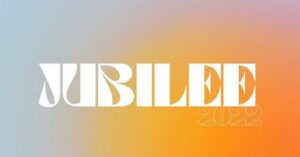 If you have followed us for long, you know about the college ministry conference in Pittsburgh called Jubilee. You may know that Beth and I worked for the CCO and served on the committee helping with the early Jubilee conferences in Pittsburgh (back in the late 1970s.) In recent decades we have served as the conference bookseller. It is by far the largest off-site event we do. We have to take a lot of books to Jubilee each year — it is, after all, about Christ’s Lordship over all of life and God’s power to bring hope and transformation to every square inch of the good but fallen creation and all that implies for faith’s impact in every sphere of society. Sometimes, Western Pennsylvania adults would swing by just to browse at the crowded pop-up book display. We took so much to Jubilee that many people thought we brought most of our store. (The sign below was a cheat-sheet for us, listing our numbered categories of topics. Whoah.)
If you have followed us for long, you know about the college ministry conference in Pittsburgh called Jubilee. You may know that Beth and I worked for the CCO and served on the committee helping with the early Jubilee conferences in Pittsburgh (back in the late 1970s.) In recent decades we have served as the conference bookseller. It is by far the largest off-site event we do. We have to take a lot of books to Jubilee each year — it is, after all, about Christ’s Lordship over all of life and God’s power to bring hope and transformation to every square inch of the good but fallen creation and all that implies for faith’s impact in every sphere of society. Sometimes, Western Pennsylvania adults would swing by just to browse at the crowded pop-up book display. We took so much to Jubilee that many people thought we brought most of our store. (The sign below was a cheat-sheet for us, listing our numbered categories of topics. Whoah.) A REAL ONLINE BOOKSTORE To try to duplicate our hefty presence at the previous conferences — offering a rare mix of resources to help students take the Jubilee vision back to their home campuses and job sites and churches — we created an online, e-commerce bookstore related specifically to the 2022 “Transform Everything” Jubilee conference. It’s a typical point and click affair and it has the US Postal shipping amount calculated automatically. It’s a bit too impersonal for our tastes (trying to redeem the online sales process with more personal emails and person-to-person interaction as we typically do) but it is efficient and handy. We think it’s pretty dang awesome. You should pay it a visit.
A REAL ONLINE BOOKSTORE To try to duplicate our hefty presence at the previous conferences — offering a rare mix of resources to help students take the Jubilee vision back to their home campuses and job sites and churches — we created an online, e-commerce bookstore related specifically to the 2022 “Transform Everything” Jubilee conference. It’s a typical point and click affair and it has the US Postal shipping amount calculated automatically. It’s a bit too impersonal for our tastes (trying to redeem the online sales process with more personal emails and person-to-person interaction as we typically do) but it is efficient and handy. We think it’s pretty dang awesome. You should pay it a visit. 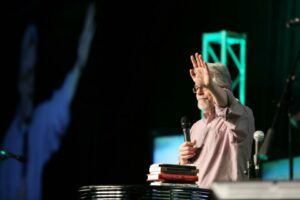 I did three fast-paced videoed book announcements so we have those titles listed in three categories. We created some interesting suggestions that follow-up on the four main keynote addresses from the main stage — creation, fall, redemption, restoration. You can see each in their own categories. And there are another 50 “rooms” you can visit at the site, each selected for these eager-to-learn young adults. Enter that online store right here:
I did three fast-paced videoed book announcements so we have those titles listed in three categories. We created some interesting suggestions that follow-up on the four main keynote addresses from the main stage — creation, fall, redemption, restoration. You can see each in their own categories. And there are another 50 “rooms” you can visit at the site, each selected for these eager-to-learn young adults. Enter that online store right here: 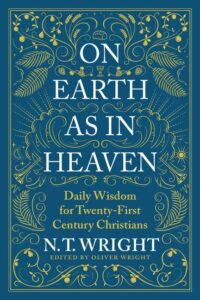 On Earth As In Heaven: Daily Wisdom for Twenty-first Century Christians N.T. Weight (HarperOne) $29.99
On Earth As In Heaven: Daily Wisdom for Twenty-first Century Christians N.T. Weight (HarperOne) $29.99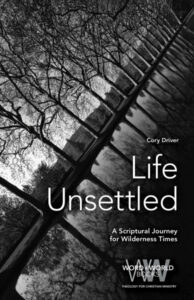 Life Unsettled: A Scriptural Journey for Wilderness Times Cory Driver (Fortress Press) 19.99
Life Unsettled: A Scriptural Journey for Wilderness Times Cory Driver (Fortress Press) 19.99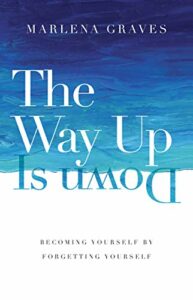 The Way Up Is Down: Becoming Yourself by Forgetting Yourself Marlena Graves (IVP) $22.00 OUR SALE PRICE = $17.60
The Way Up Is Down: Becoming Yourself by Forgetting Yourself Marlena Graves (IVP) $22.00 OUR SALE PRICE = $17.60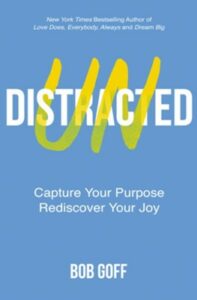 Undistracted: Capture Your Purpose, Rediscover Your Joy Bob Goff (Thomas Nelson) $26.99
Undistracted: Capture Your Purpose, Rediscover Your Joy Bob Goff (Thomas Nelson) $26.99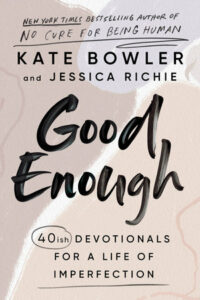 Good Enough: 40ish Devotionals for a Life of Imperfection Kate Bowler and Jessica Richie (Convergent) $21.00
Good Enough: 40ish Devotionals for a Life of Imperfection Kate Bowler and Jessica Richie (Convergent) $21.00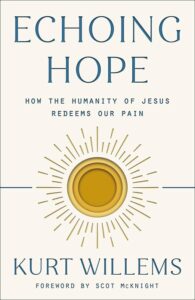 Echoing Hope: How the Humanity of Jesus Redeems Our Pain Kurt Willems (Waterbrook) $16.00
Echoing Hope: How the Humanity of Jesus Redeems Our Pain Kurt Willems (Waterbrook) $16.00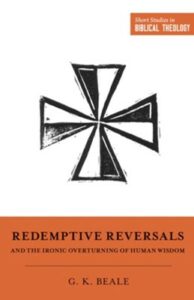 Redemptive Reversals and the Ironic Overturning of Human Wisdom G.K, Beale (Crossway) $14.99
Redemptive Reversals and the Ironic Overturning of Human Wisdom G.K, Beale (Crossway) $14.99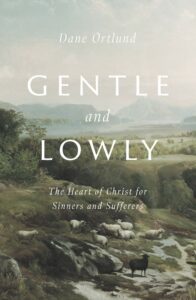 Gentle and Lowly: The Heart of Christ for Sinners and Sufferers Dane Ortlund (Crossway) $19.99
Gentle and Lowly: The Heart of Christ for Sinners and Sufferers Dane Ortlund (Crossway) $19.99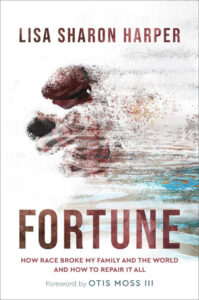 Fortune: How Race Broke My Family and the World —and How to Repair It All. Lisa Sharon Harper ( Brazos Press) $24.99
Fortune: How Race Broke My Family and the World —and How to Repair It All. Lisa Sharon Harper ( Brazos Press) $24.99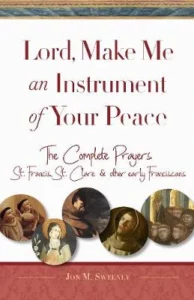 Lord, Make Me An Instrument of Your Peace: The Complete Prayers of St. Francis, St. Clare, and other early Franciscans Jon M. Sweeney (Paraclete Press) $25.00 OUR SALE PRICE = $20.00
Lord, Make Me An Instrument of Your Peace: The Complete Prayers of St. Francis, St. Clare, and other early Franciscans Jon M. Sweeney (Paraclete Press) $25.00 OUR SALE PRICE = $20.00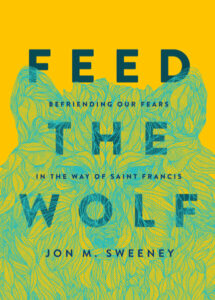 Befriending Our Fears in the Way of Saint Francis [Broadleaf Books; $26.99.]) Again, Sweeney knows this Franciscan stuff very well.
Befriending Our Fears in the Way of Saint Francis [Broadleaf Books; $26.99.]) Again, Sweeney knows this Franciscan stuff very well.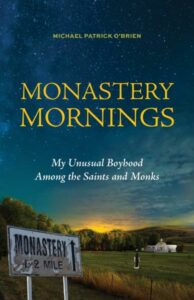 Monastery Mornings: My Unusual Boyhood Among the Saints and Monks Michael Patrick O’Brien (Paraclete Press) $18.00
Monastery Mornings: My Unusual Boyhood Among the Saints and Monks Michael Patrick O’Brien (Paraclete Press) $18.00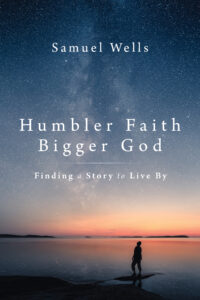 Humbler Faith, Bigger God: Finding a Story to Live By Samuel Wells (Eerdmans) $22.99
Humbler Faith, Bigger God: Finding a Story to Live By Samuel Wells (Eerdmans) $22.99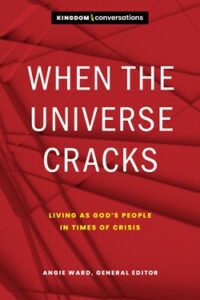 When the Universe Cracks: Living as God’s People in Times of Crisis edited by Angie Ward (NavPress) $16.99
When the Universe Cracks: Living as God’s People in Times of Crisis edited by Angie Ward (NavPress) $16.99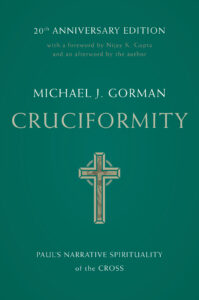 Cruciformity: Paul’s Narrative Spirituality of the Cross 20th Anniversary Edition Michael J.Gorman (Eerdmans) $40.00
Cruciformity: Paul’s Narrative Spirituality of the Cross 20th Anniversary Edition Michael J.Gorman (Eerdmans) $40.00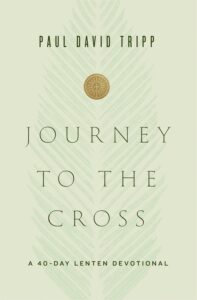 Journey to the Cross: A 40-Day Lenten Devotional Paul David Tripp (Crossway) $23.99
Journey to the Cross: A 40-Day Lenten Devotional Paul David Tripp (Crossway) $23.99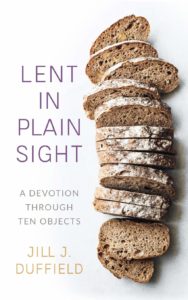 Lent in Plain Sight : Devotions Through Ten Objects
Lent in Plain Sight : Devotions Through Ten Objects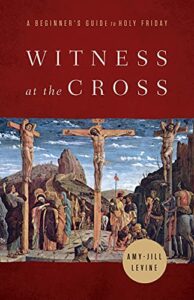 Witness at the Cross: A Beginner’s Guide to Holy Friday Amy-Jill Levine (Abingdon) $17.99
Witness at the Cross: A Beginner’s Guide to Holy Friday Amy-Jill Levine (Abingdon) $17.99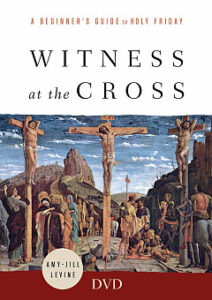 in the Gospels. For each, Jesus has a particular meaning and message, and from each, we learn how those meanings and messages cross the centuries to any who would come to the cross today.
in the Gospels. For each, Jesus has a particular meaning and message, and from each, we learn how those meanings and messages cross the centuries to any who would come to the cross today.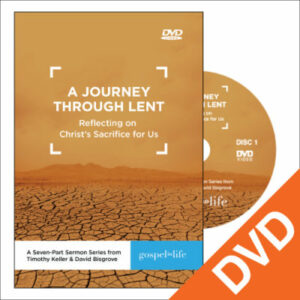 DVD A Journey Through Lent: Reflecting Christ’s Sacrifice for Us: A Seven-Part Sermon Series from Timothy Keller & David Bisgrove (Gospel in Life Resources by Redeemer Presbyterian Church) $24.95
DVD A Journey Through Lent: Reflecting Christ’s Sacrifice for Us: A Seven-Part Sermon Series from Timothy Keller & David Bisgrove (Gospel in Life Resources by Redeemer Presbyterian Church) $24.95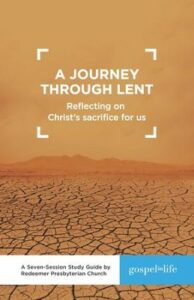 A Journey Through Lent: Reflecting Christ’s Sacrifice for Us: A Seven-Session Study Guide by Redeemer Presbyterian Church Tim Keller & David Bisgrove (Gospel in Life Resources by Redeemer Presbyterian Church) $9.95
A Journey Through Lent: Reflecting Christ’s Sacrifice for Us: A Seven-Session Study Guide by Redeemer Presbyterian Church Tim Keller & David Bisgrove (Gospel in Life Resources by Redeemer Presbyterian Church) $9.95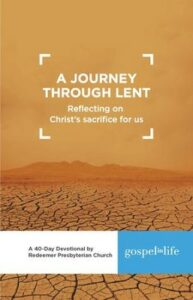 A Journey Through Lent: Reflecting Christ’s Sacrifice for Us: A 40 Day Devotional by Redeemer Presbyterian Church
A Journey Through Lent: Reflecting Christ’s Sacrifice for Us: A 40 Day Devotional by Redeemer Presbyterian Church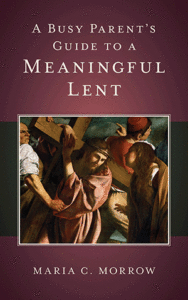 A Busy Parent’s Guide to a Meaningful Lent Maria C. Morrow (Our Sunday Visitor) $16.95
A Busy Parent’s Guide to a Meaningful Lent Maria C. Morrow (Our Sunday Visitor) $16.95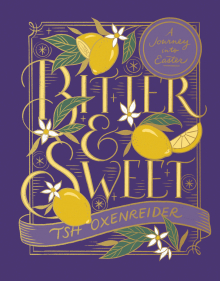 Bitter & Sweet: A Journey into Easter Tsh Oxenreider (Harvest House) $22.99
Bitter & Sweet: A Journey into Easter Tsh Oxenreider (Harvest House) $22.99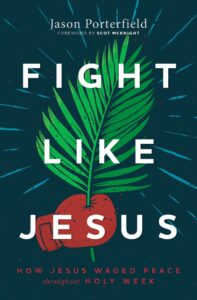 Fight Like Jesus: How Jesus Waged Peace Throughout Holy Week Jason Porterfield (Herald Press) $17.99
Fight Like Jesus: How Jesus Waged Peace Throughout Holy Week Jason Porterfield (Herald Press) $17.99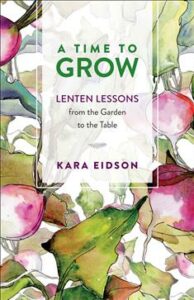 A Time to Grow: Lenten Lessons from the Garden to the Table Kara Eidson (WJK) $16.00
A Time to Grow: Lenten Lessons from the Garden to the Table Kara Eidson (WJK) $16.00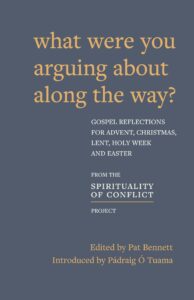 What Were You Arguing About Along the Way? Gospel Reflections for Advent, Christmas, Lent, Holy Week, and Easter edited by Pat Bennett, introduced by Padraig O’Tuama (Canterbury Press) $27.99
What Were You Arguing About Along the Way? Gospel Reflections for Advent, Christmas, Lent, Holy Week, and Easter edited by Pat Bennett, introduced by Padraig O’Tuama (Canterbury Press) $27.99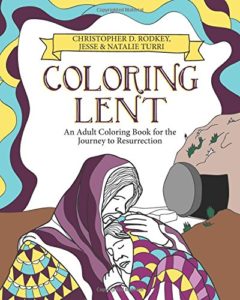 Coloring Lent: An Adult Coloring Book for the Journey to Resurrection Christopher Rodkey, with illustrations by Jesse & Natalie Turri (Christian Board of Publication/Chalice Press) $12.99 OUR SALE PRICE = $10.39
Coloring Lent: An Adult Coloring Book for the Journey to Resurrection Christopher Rodkey, with illustrations by Jesse & Natalie Turri (Christian Board of Publication/Chalice Press) $12.99 OUR SALE PRICE = $10.39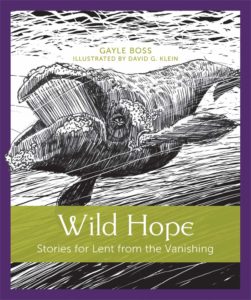 Wild Hope: Stories for Lent from the Vanishing
Wild Hope: Stories for Lent from the Vanishing 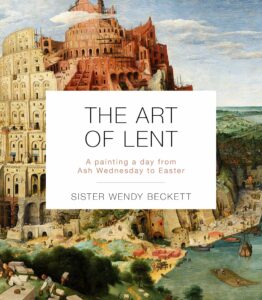 The Art of Lent: A Painting a Day from Ash Wednesday to Easter Sister Wendy Beckett (IVP; $17.00OUR SALE PRICE = $13.60
The Art of Lent: A Painting a Day from Ash Wednesday to Easter Sister Wendy Beckett (IVP; $17.00OUR SALE PRICE = $13.60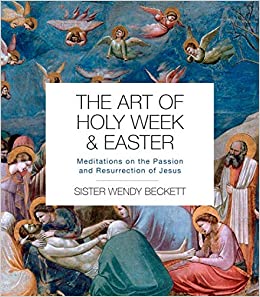 Holy Week and Easter.
Holy Week and Easter.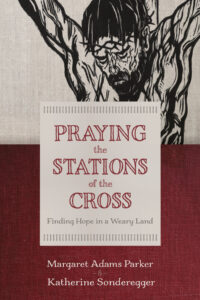 Praying the Stations of the Cross: Finding Hope in a Weary Land Margaret Adams Parker & Katherine Sonderegger (Eerdmans) $21.99
Praying the Stations of the Cross: Finding Hope in a Weary Land Margaret Adams Parker & Katherine Sonderegger (Eerdmans) $21.99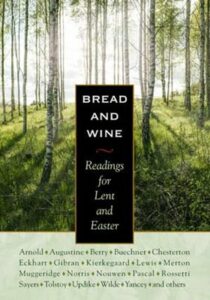 Bread and Wine: Readings for Lent and Easter (Plough Publishing) $24.00 This is a perennial title from Plough and matches nice their popular Advent collection, Watch for the Light
Bread and Wine: Readings for Lent and Easter (Plough Publishing) $24.00 This is a perennial title from Plough and matches nice their popular Advent collection, Watch for the Light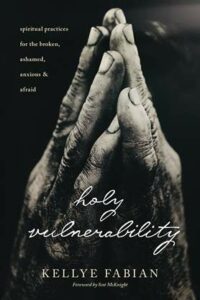 Holy Vulnerability: Spiritual Practices for the Broken, Ashamed, Anxious, & Afraid
Holy Vulnerability: Spiritual Practices for the Broken, Ashamed, Anxious, & Afraid 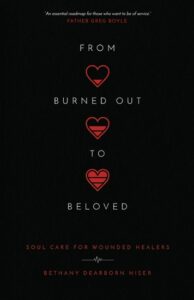 From Burnout to Beloved: Soul Care for the Wounded Healers Bethany Dearborn Hiser (IVP) $18.00
From Burnout to Beloved: Soul Care for the Wounded Healers Bethany Dearborn Hiser (IVP) $18.00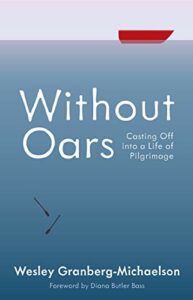 Without Oars: Casting Off into a Life of Pilgrimage
Without Oars: Casting Off into a Life of Pilgrimage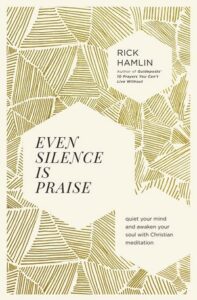 Even Silence Is Praise Rick Hamlin (Word/Thomas Nelson) $18.99
Even Silence Is Praise Rick Hamlin (Word/Thomas Nelson) $18.99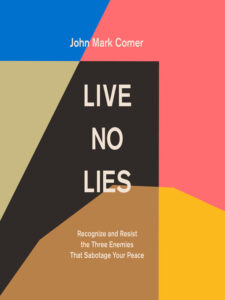 Live No Lies: Recognize and Resist the Three Enemies That Sabotage Your Peace John Mark Comer (Waterbrook) $25.00 OUR SALE PRICE = $20.00
Live No Lies: Recognize and Resist the Three Enemies That Sabotage Your Peace John Mark Comer (Waterbrook) $25.00 OUR SALE PRICE = $20.00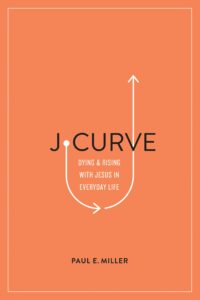 J Curve: Dying and Rising with Jesus in Everyday Life Paul Miller (Crossway) $22.99
J Curve: Dying and Rising with Jesus in Everyday Life Paul Miller (Crossway) $22.99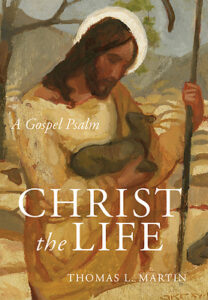 Christ the Life: A Gospel Psalm Thomas K. Martin (Paraclete) $22.00 OUR SALE PRICE = $17.60
Christ the Life: A Gospel Psalm Thomas K. Martin (Paraclete) $22.00 OUR SALE PRICE = $17.60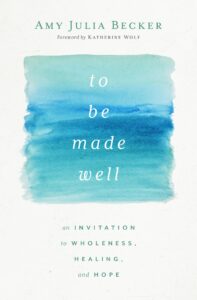 To Be Made Well: An Invitation to Wholeness, Healing, and Hope Amy Julia Becker (Herald Press) $17.99
To Be Made Well: An Invitation to Wholeness, Healing, and Hope Amy Julia Becker (Herald Press) $17.99 A Wilderness Zone Walter Brueggemann (Cascade) $21.00
A Wilderness Zone Walter Brueggemann (Cascade) $21.00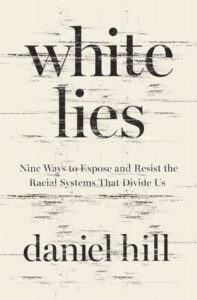 White Lies: Nine Ways to Expose and Resist the Racial Systems That Divide Us Daniel Hill (Zondervan) $25.99
White Lies: Nine Ways to Expose and Resist the Racial Systems That Divide Us Daniel Hill (Zondervan) $25.99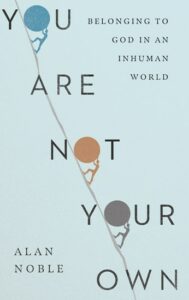 You Are Not Your Own: Belonging to God in an Inhuman World Alan Noble (IVP) $22.00
You Are Not Your Own: Belonging to God in an Inhuman World Alan Noble (IVP) $22.00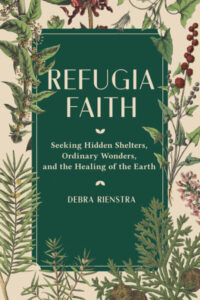 Refugia Faith: Seeking Hidden Shelters, Ordinary Wonders, and the Healing of the EarthDebra Rienstra (Fortress Press) $23.99OUR SALE PRICE = $19.19
Refugia Faith: Seeking Hidden Shelters, Ordinary Wonders, and the Healing of the EarthDebra Rienstra (Fortress Press) $23.99OUR SALE PRICE = $19.19